Indiana Documents
Quitclaim Deed
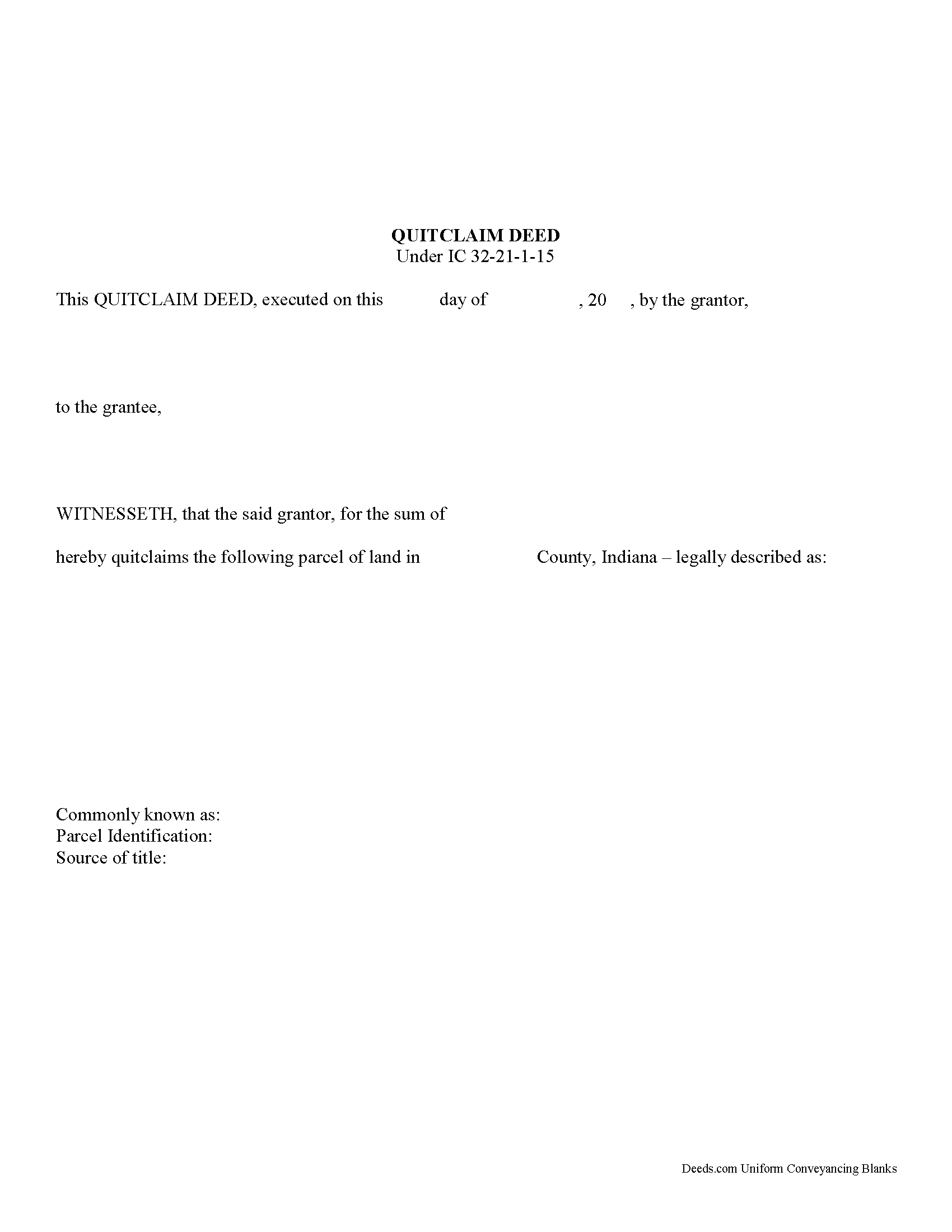
Indiana Quitclaim Deed Form Content Requirements:
IC 32-17-2-2 defines a quitclaim deed as one which "passes all the estate that the grantor . . . may convey." The requirements for lawful execution of quitclaim deeds are covered in IC 32-21-1, 2, 13; 32-21-2-3; 36-2-11-15. First, any document conveying ownership in real property must be in writing and be signed by the grantor or an authorized agent. Enter the names and addresses of all grantors and grantees. Be sure that all names in the quitclaim deed are the same throughout the document. For example, if the grantor is Jonathan X. Smith, but he signs it Johnny Smith, the recorder's office might reject the deed. Include the type and amount of consideration (often money). Provide a complete legal description of the property. All signatures must be original and notarized, and the signor's name must be typed or printed just below the signature. In the space at the end, the quitclaim deed should contain a return address (usually the grantee) to receive the recorded deed and future tax bills, and the preparer's name and social security number statement.
Recording:
IC 32-21-3-3 states that quitclaim deeds and other conveyances ... More Information about the Indiana Quitclaim Deed
Gift Deed

Gifting Real Property (Real Estate) in Indiana
Gift deeds convey title to real property from one party to another with no exchange of consideration, monetary or otherwise. Often used to transfer property between family members or to gift property as a charitable act or donation, these conveyances occur during the grantor's lifetime. Gift deeds must contain language that explicitly states that no consideration is expected or required. Ambiguous language, or references to any type of consideration, can make the gift deed contestable in court.
A lawful gift deed includes the grantor's full name and marital status, as well as the grantee's full name, marital status, vesting information, and mailing address. Vesting describes how the grantee holds title to the property. Generally, real property is owned in either sole ownership or co-ownership. For Indiana residential property, the primary methods for holding title are tenancy in common, joint tenancy, and tenancy by the entirety (I.C. 32-21-10-2). An estate conveyed to two or more people is presumed a tenancy in common, unless otherwise specified (I.C. 32-17-2-1). An estate conveyed to a married couple vests as tenancy by the ent... More Information about the Indiana Gift Deed
Warranty Deed
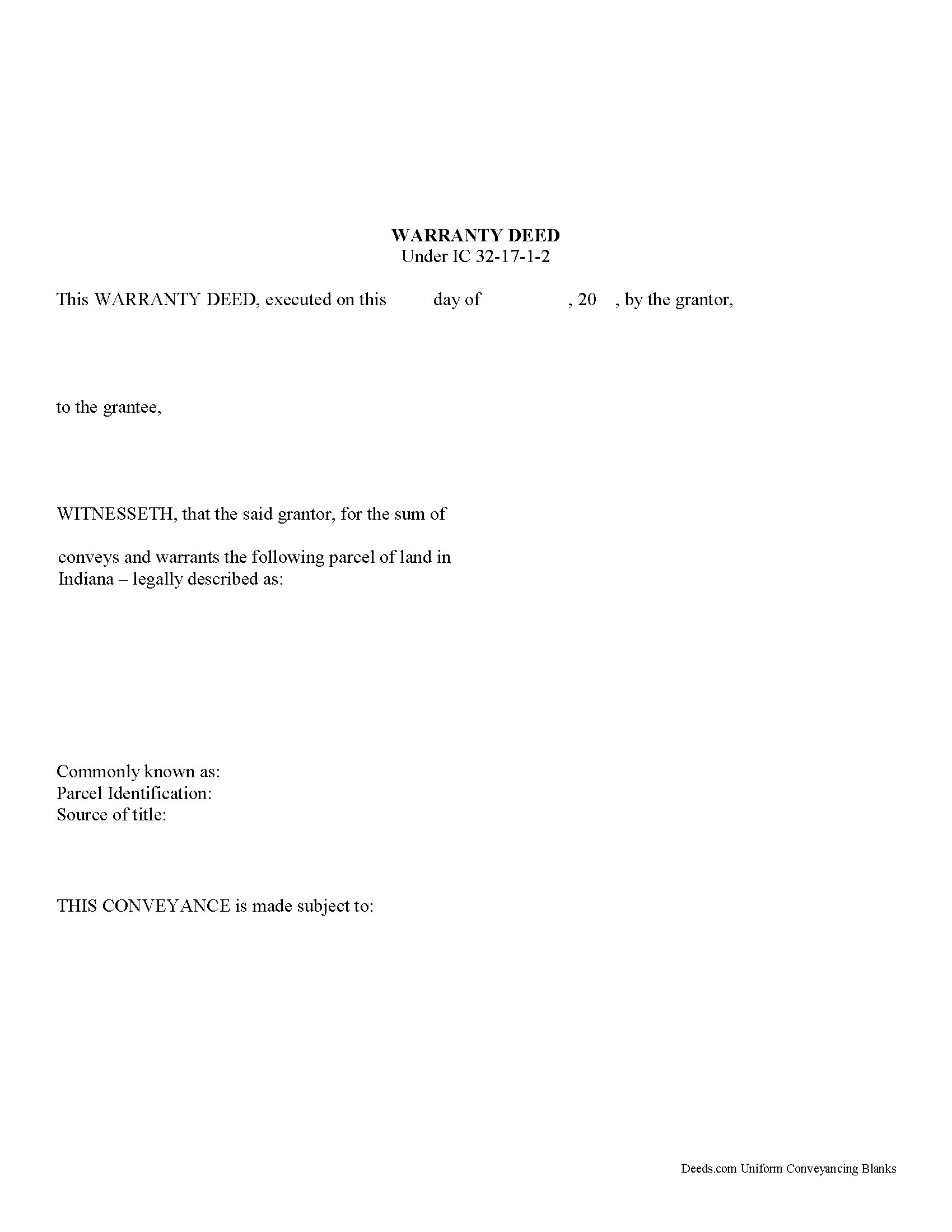
The Indiana Revised Code does not offer a statutory form for a warranty deed; however, the statutes do contain language that is sufficient for a conveyance of real estate in fee simple (32-17-1-2). A deed that is worded according to 32-17-1-2 will contain the following covenants from the grantor and the grantor's heirs and personal representatives: (1) that the grantor is lawfully seized of the premises; (2) has good right to convey the premises; (3) guarantees the quiet possession of the premises; (4) guarantees that the premises are free from all encumbrances; and (5) will warrant and defend the title to the premises against all lawful claims ( 32-17-1-2). The warranty deed is a commonly used real estate deed in Indiana for residential transactions.
A warranty deed in this state must be dated and signed, sealed, and acknowledged by the grantor in order to be submitted for recording to a county recorder in Indiana. If warranty deeds are not acknowledged by the grantor, they can be proved before any of the officers listed in 32-21-2-3 of the Indiana Revised Code. Further, deeds can be acknowledged in another county or state, but must be certified by the clerk of the circuit cou... More Information about the Indiana Warranty Deed
Special Warranty Deed
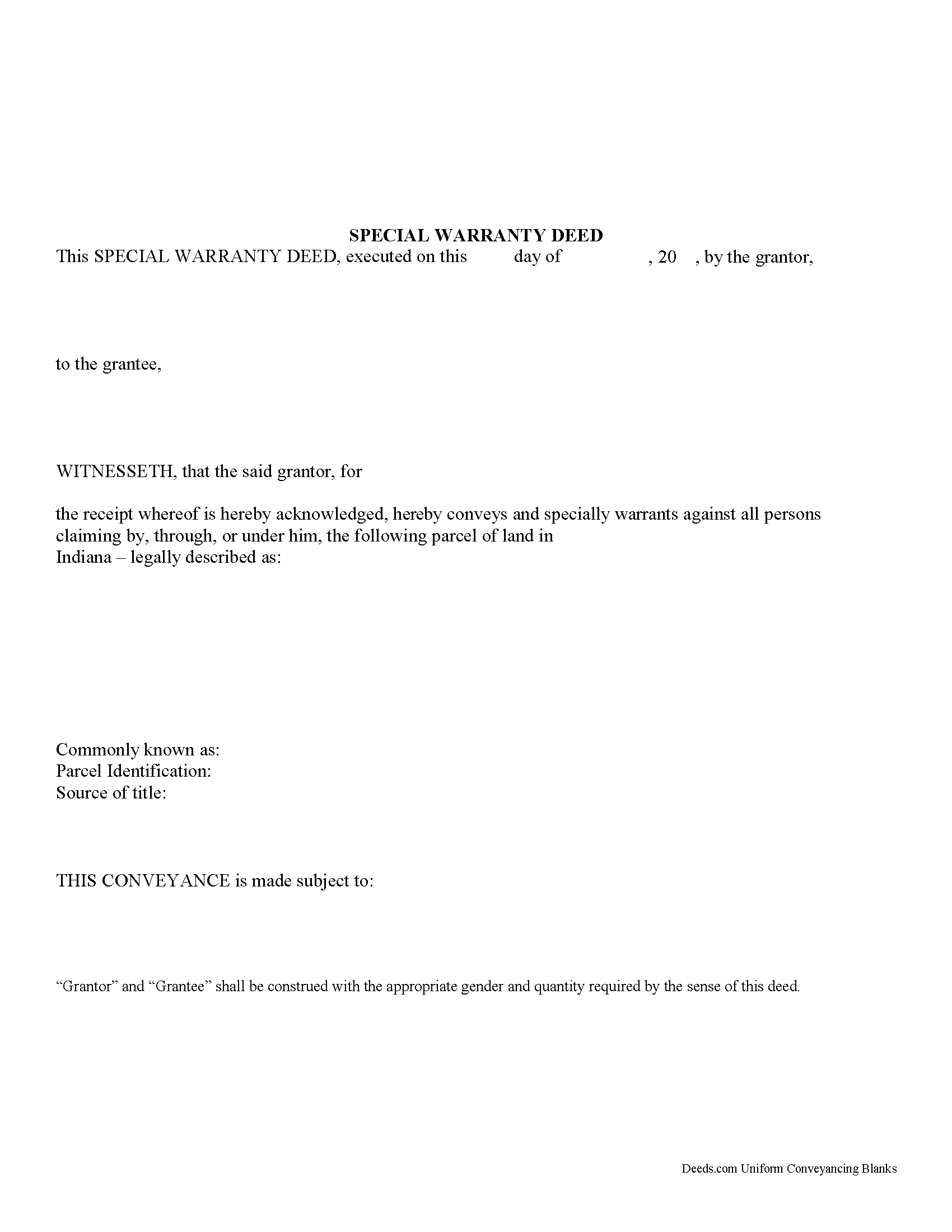
Although the Indiana Revised Code does not offer a statutory form for a special warranty deed, the statutes do contain language that is sufficient for a conveyance of real estate in fee simple (32-17-1-2). A special warranty deed, though it generally contains warranties of title, offers less protection for the buyer than a warranty deed. The grantor in a special warranty deed offers covenants pertaining only to the grantor's period of ownership. A grant deed that is worded according to 32-17-1-2 will contain the following covenants from the grantor and the grantor's heirs and personal representatives: (1) that the grantor is lawfully seized of the premises; (2) has good right to convey the premises; (3) guarantees the quiet possession of the premises; (4) guarantees that the premises are free from all encumbrances; and (5) will warrant and defend the title to the premises against the lawful claims of those claiming under the grantor (32-17-1-2).
In order to submit a special warranty deed to a county recorder in Indiana, it must be dated and signed, sealed, and acknowledged by the grantor. If a special warranty deed does not contain a proper acknowledgement, it can be proved bef... More Information about the Indiana Special Warranty Deed
Grant Deed
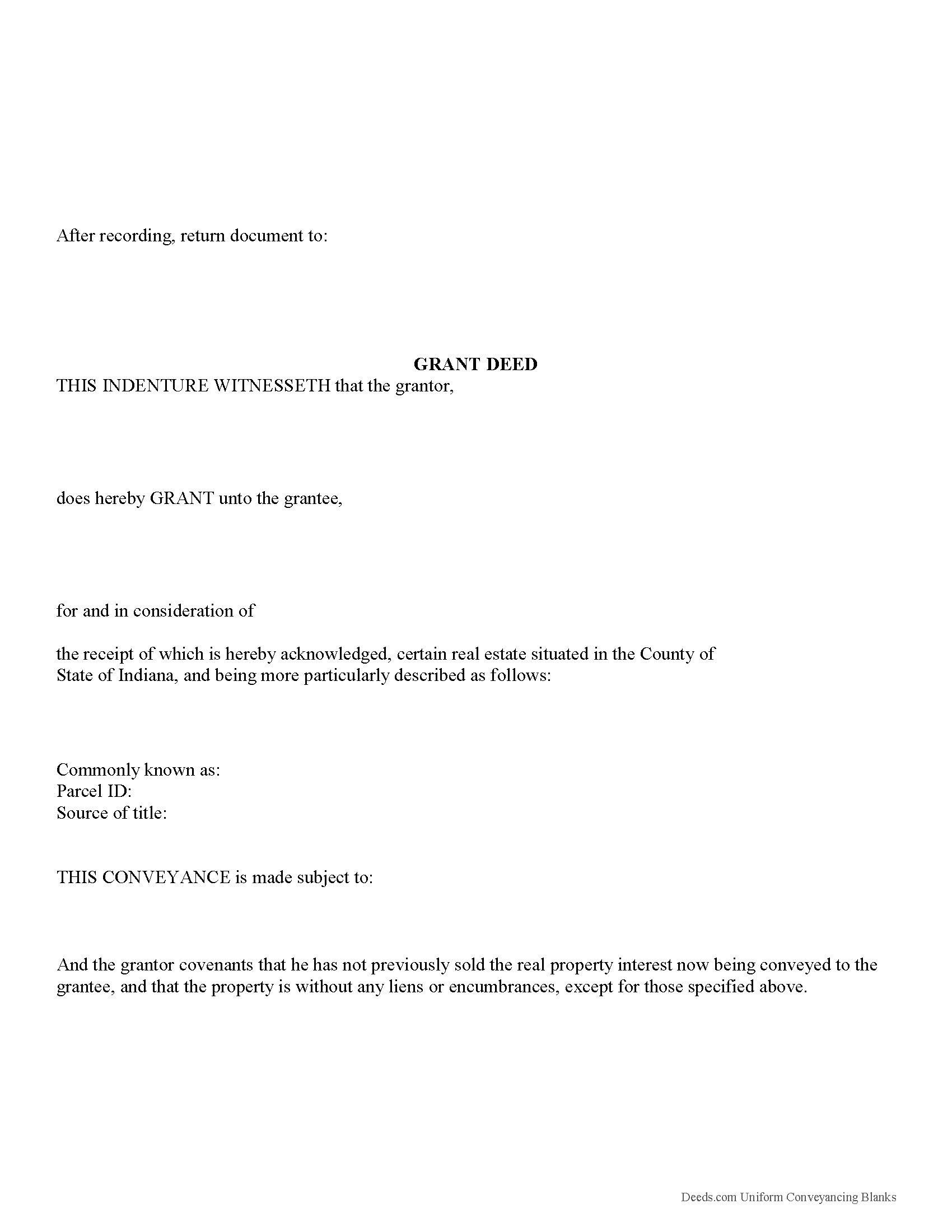
A grant deed is a legal document used to transfer, or convey, rights in real property from a grantor (seller) to a grantee (buyer). It contains implied covenants that the grantor has not previously sold the real property interest and that the property is conveyed without any undisclosed liens or encumbrances. Grant deeds typically do not require the grantor to defend title claims.
A lawful deed includes the grantor's full name and marital status, as well as the grantee's full name, marital status, mailing address, and vesting. Vesting describes how the grantee holds title to the property. For Indiana residential property, the primary methods for holding title in co-ownership are tenancy in common, joint tenancy, and tenancy by entirety (I.C. 32-21-10-2). An estate conveyed to two or more people is presumed a tenancy in common, unless otherwise specified (I.C. 32-17-2-1). An estate conveyed to a married couple vests as tenancy by the entirety unless otherwise specified (I.C. 32-17-3-1). Joint tenancy must be written into the text of the document.
As with any conveyance of real estate, a grant deed requires a complete legal description of the parcel. Recite the source of title... More Information about the Indiana Grant Deed
Correction Deed
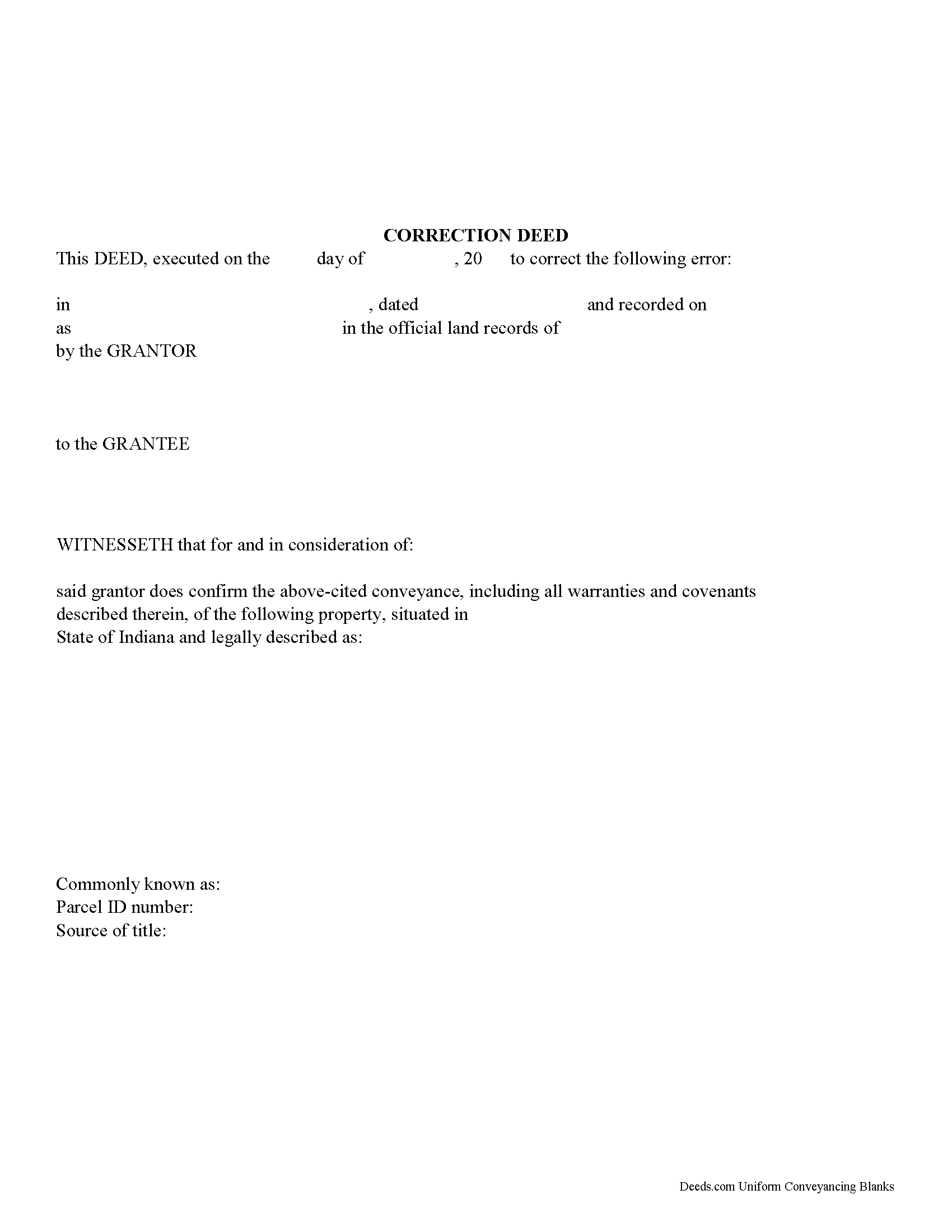
Use this form to correct an error in a fee simple, quitclaim, or joint deed of conveyance in Indiana, thus eliminating potential title flaws.
In Indiana, a previously recorded deed can be corrected by recording a second deed, called a correction or corrective deed. The sole purpose of such a document is to prevent potential title flaws, which may create problems when the current owner attempts to sell the property to a third party. The correction deed does not convey title but confirms the prior conveyance. For the most part it reiterates the prior deed verbatim, except for the corrected item.
The errors usually adjusted by a corrective deed are minor omissions or typographical mistakes, sometimes called scrivener's errors. Among those are misspelled names, omitted or wrong middle initial, a minor error in the property description, or an omitted execution date.
The corrective deed must state that its sole purpose is to correct a specific error, identified by type. For example: an error in the grantor's name, or an error in the grantor's marital status. The latter might also require an additional signature by the grantor's spouse in the acknowledgement section of the deed... More Information about the Indiana Correction Deed
Easement Deed
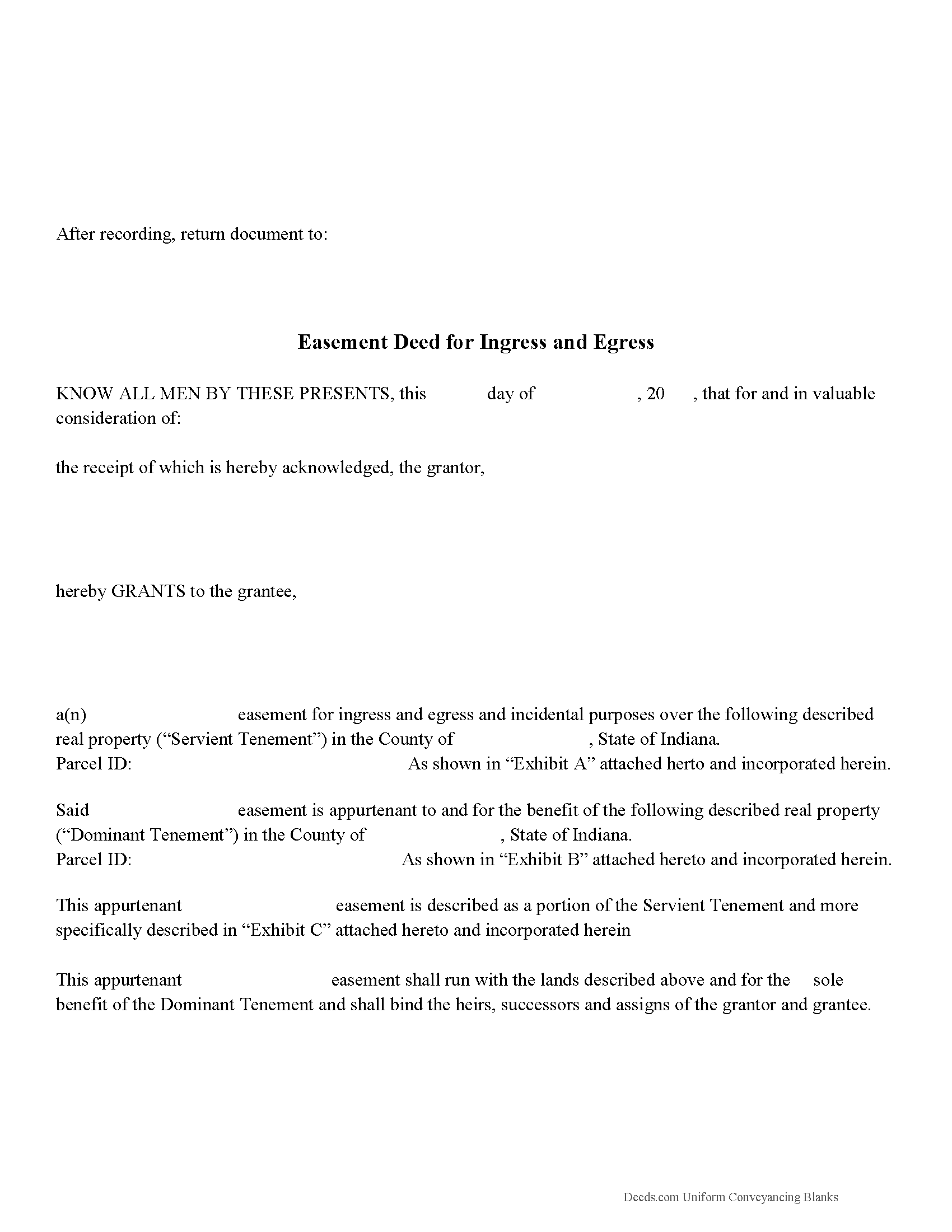
Easements in Indiana are commonly created by prescription, in gross, in appurtenant, or by necessity. An easement is a non-possessory and non-ownership right of one person to use the real property of another person for a specific purpose. The easement deed is the instrument in writing that creates the right. Additional easements, such as solar easements and conservation easements, can also be obtained in Indiana. A solar easement can be obtained for the purpose of exposure of a solar energy devise or passive solar energy system to the direct rays of the sun (32-23-4-2). A conservation easement is a non-possessory interest of a holder of real property that imposes limitations or affirmative obligations for purposes as outlined in 32-23-5-2 of the Indiana Revised Code. Conservation and solar easements are subject to the same conveyance and recording requirements as other easements in this state.
An easement created after June 30, 1989 must cross reference the original recorded plat. If the real property from which the easement is being created is not platted, the easement must cross reference the most recent deed of record for that property in the recorder's office (32-23-2-5).
... More Information about the Indiana Easement Deed
Termination, Cancellation of Easement / Right of Way
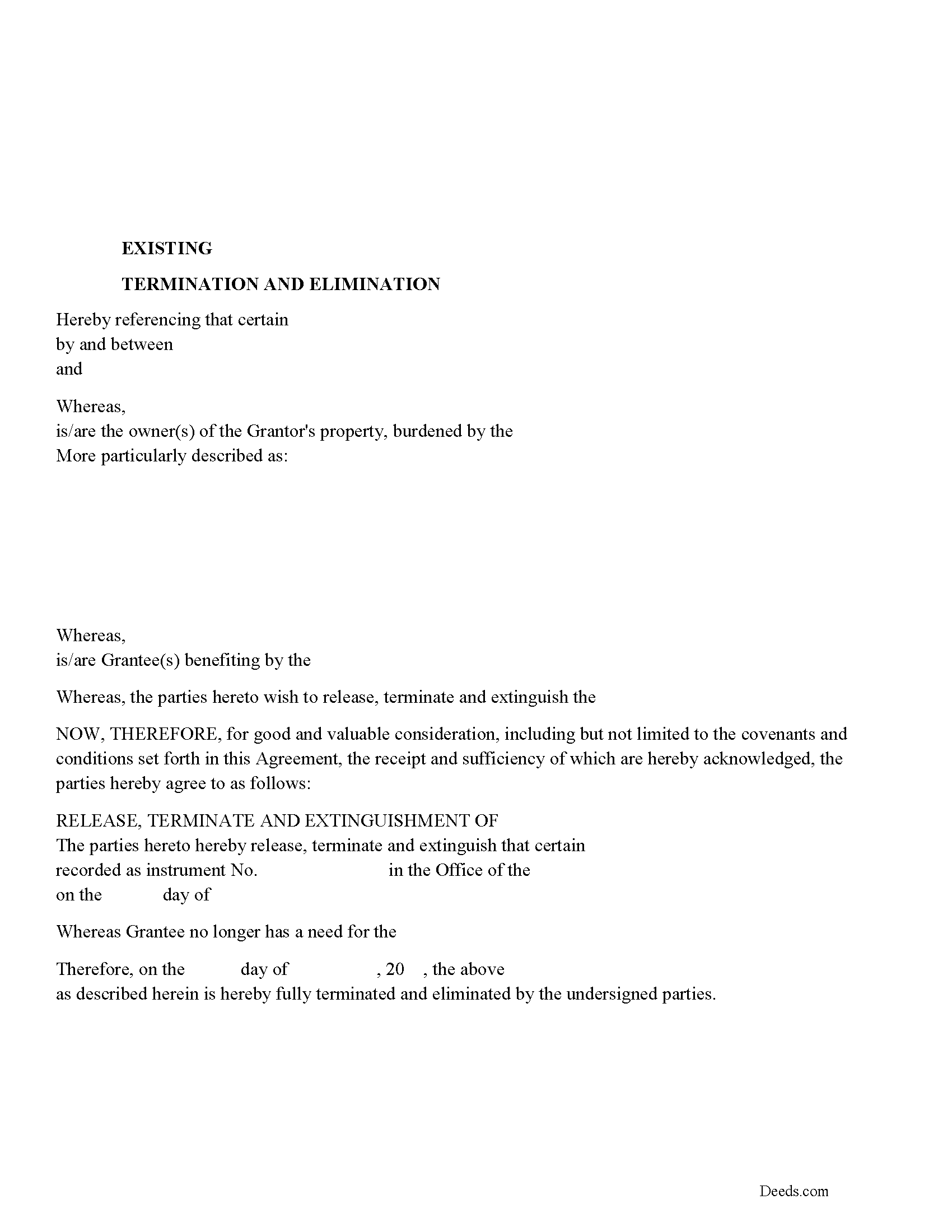
Use this form to release, terminate, extinguish a previously recorded document that involves access to and from a property.
Documents such as:
1. Easement Deeds or Agreements (An easement is a non-possessory interest in land, granting the right to use someone else's property for a specific purpose, like a driveway or utility line)
2. Access Roads
3. Right of Ways
4. Utility Easements (Power, Gas, Water, Sewer, Etc.)
5. Drainage Easements
This document allows the owner of the land, burdened by the access and the party that benefits from the access, to sign an agreement releasing the property from such access, ... More Information about the Indiana Termination, Cancellation of Easement / Right of Way
Mineral Deed
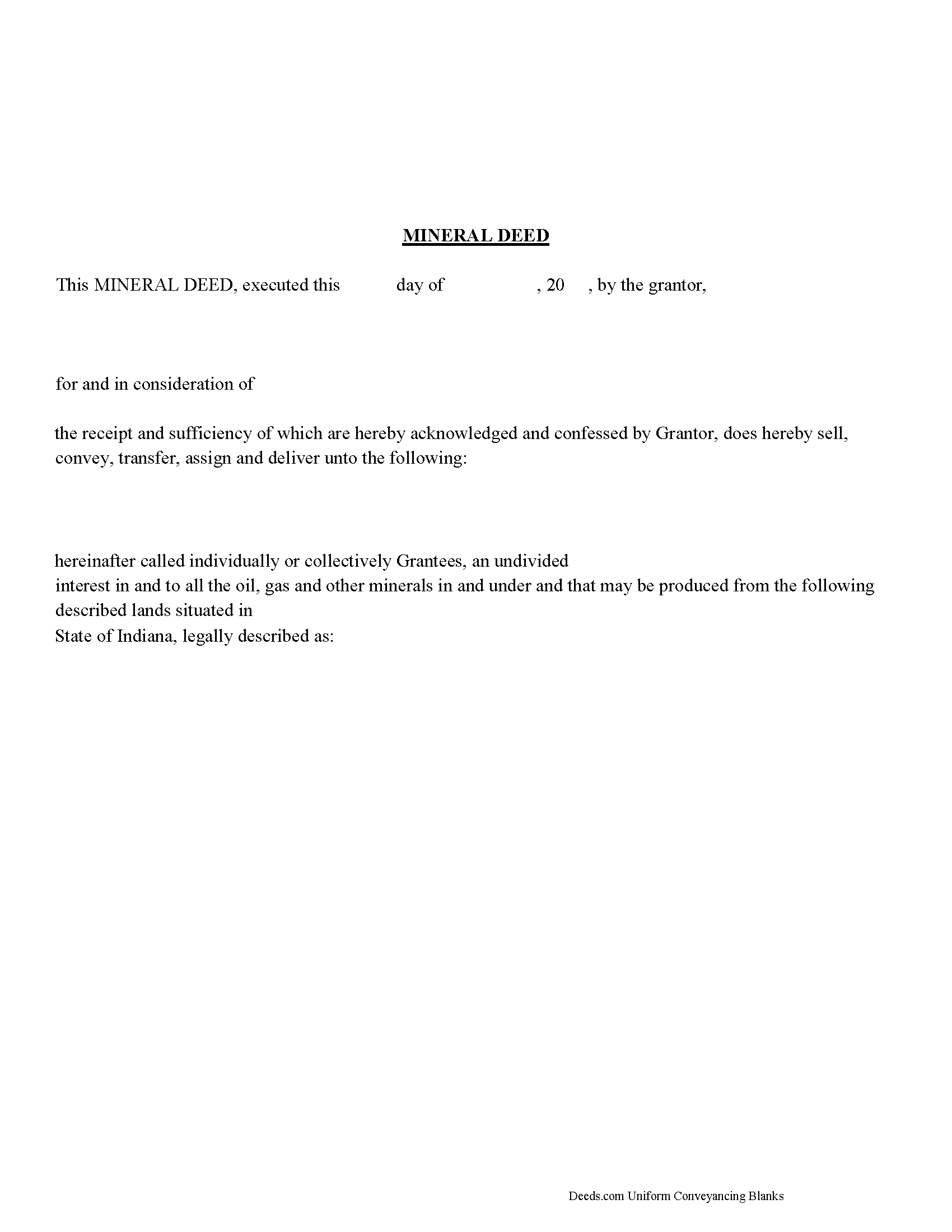
The General Mineral Deed in Indiana transfers oil, gas, and mineral rights from the grantor to the grantee. THIS IS NOT A LEASE. There are no Exceptions or Reservations included.
The transfer includes the oil, gas and other minerals of every kind and nature. It also transfers any and all rights to receive royalties, overriding royalties, net profits interests or other payments out of or with respect to those oil, gas and other minerals. The Grantor can stipulate the percentage of Mineral Rights the Grantee will receive and is made subject to any rights existing under any valid and subsisting oil and gas lease or leases of record.
This general mineral deed gives the grantee the right to access, for the purpose of mining, drilling, exploring, operating and developing said lands for oil, gas, and other minerals, and storing handling, transporting and marketing of such.
In this document the Grantor Warrants and will defend said Title to Grantee. Use of this document has a permanent effect on your rights to the property, if you are not completely sure of what you are executing seek the advice of a legal professional.
(Indiana Mineral Deed Package includes form, guidelines, a... More Information about the Indiana Mineral Deed
Mineral Deed with Quitclaim Covenants
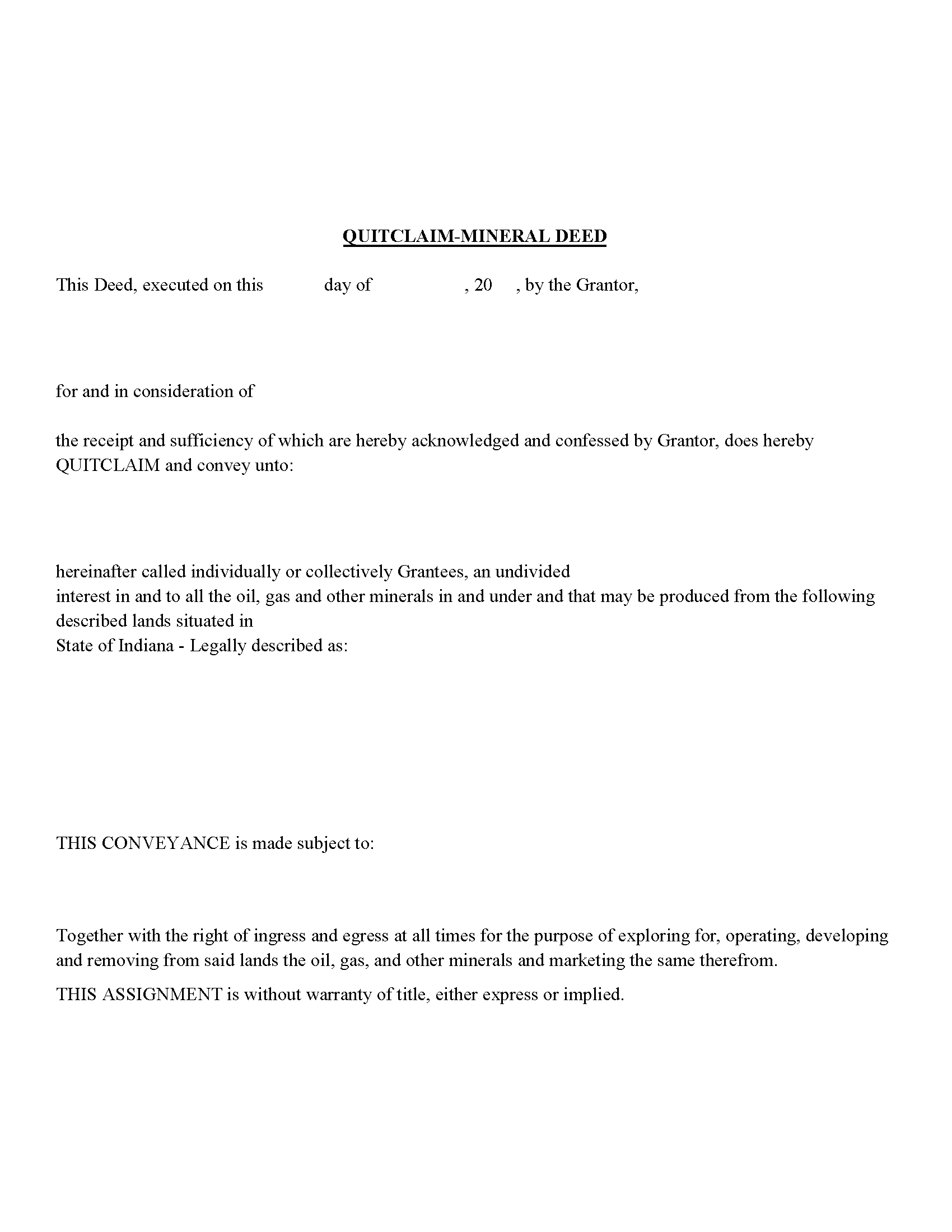
The General Mineral Deed in Indiana Quitclaims oil, gas, and mineral rights from the grantor to the grantee. THIS IS NOT A LEASE. There are no Exceptions or Reservations included.
The transfer includes the oil, gas and other minerals of every kind and nature. The Grantor can stipulate the percentage of Mineral Rights the Grantee will receive.
This general mineral deed gives the grantee the right to access, for the purpose of mining, drilling, exploring, operating and developing said lands for oil, gas, and other minerals, and storing handling, transporting and marketing of such.
The seller, or grantor Quitclaims the mineral rights and does NOT accept responsibility to any discrepancy of title (This assignment is without warranty of title, either express or implied)
Uses: Mineral deeds with quitclaim are often used in situations where the grantor wants to quickly release any interest they might have in mineral rights, such as in settling estates, resolving disputes, clearing up uncertainties about ownership in a title's history or when mineral rights have previously been severed or fragmented from surface rights and cloud a title, making it difficult to transfer property... More Information about the Indiana Mineral Deed with Quitclaim Covenants
Transfer on Death Deed
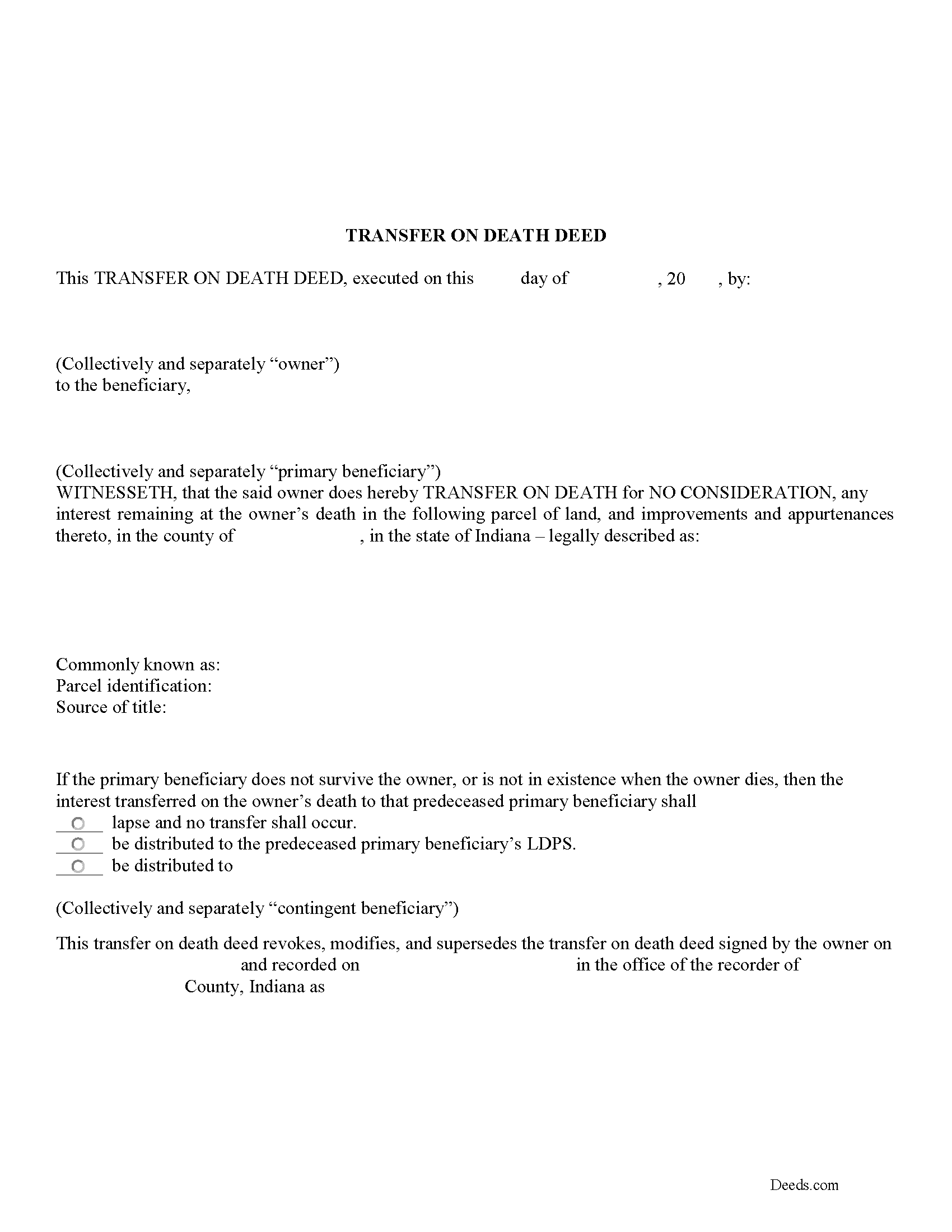
Indiana outlines the rules for its transfer on death deed in I.C. 32-17-14 -- the "Transfer on Death Property Act."
Indiana transfer on death deeds transfer ownership rights of real property to a predetermined beneficiary after the owner's death. This enables Indiana residents to pass their real estate to their heirs outside of probate. The owners keep full control over the property during their lives -- the conveyance only occurs after the owners die -- so they may sell, rent or use the land as they wish. They may change the designated beneficiary or cancel the entire transfer by simply executing a revocation that redefines their wishes.
Note that this is only valid when it is executed (signed) and recorded WHILE THE OWNER IS STILL ALIVE. If not, the deed is void and the property passes through probate with the rest of the owner's estate.
These conveyances might also have an impact on taxes and eligibility for healthcare programs. Carefully review all aspects of estate planning when considering a transfer on death deed.
(Indiana Transfer on Death Deed Package includes form, guidelines, and completed example)... More Information about the Indiana Transfer on Death Deed
Transfer on Death Deed Revocation

Use this form when the land owner wishes to completely cancel a previously recorded transfer on death deed. A revocation of transfer on death deed allows the owner to formally revoke the future conveyance and enter that change in the public record.
According to IC 32-17-14-16, there are two primary ways to revoke a transfer on death deed in Indiana:
If the real estate owner (grantor) decides to change the beneficiary or modify the way in which beneficiaries will hold title to the property when the owner dies, he/she simply completes and records a new transfer on death deed with the updated information.
If the land owner wishes to completely cancel a previously recorded transfer on death deed, a revocation may be a better idea. A properly executed revocation of transfer on death deed allows the owner to formally revoke the future conveyance and enter that change in the public record.
(Indiana Transfer on Deed Revocation Package includes form, guidelines, and completed example)... More Information about the Indiana Transfer on Death Deed Revocation
Transfer on Death Deed Beneficiary Affidavit
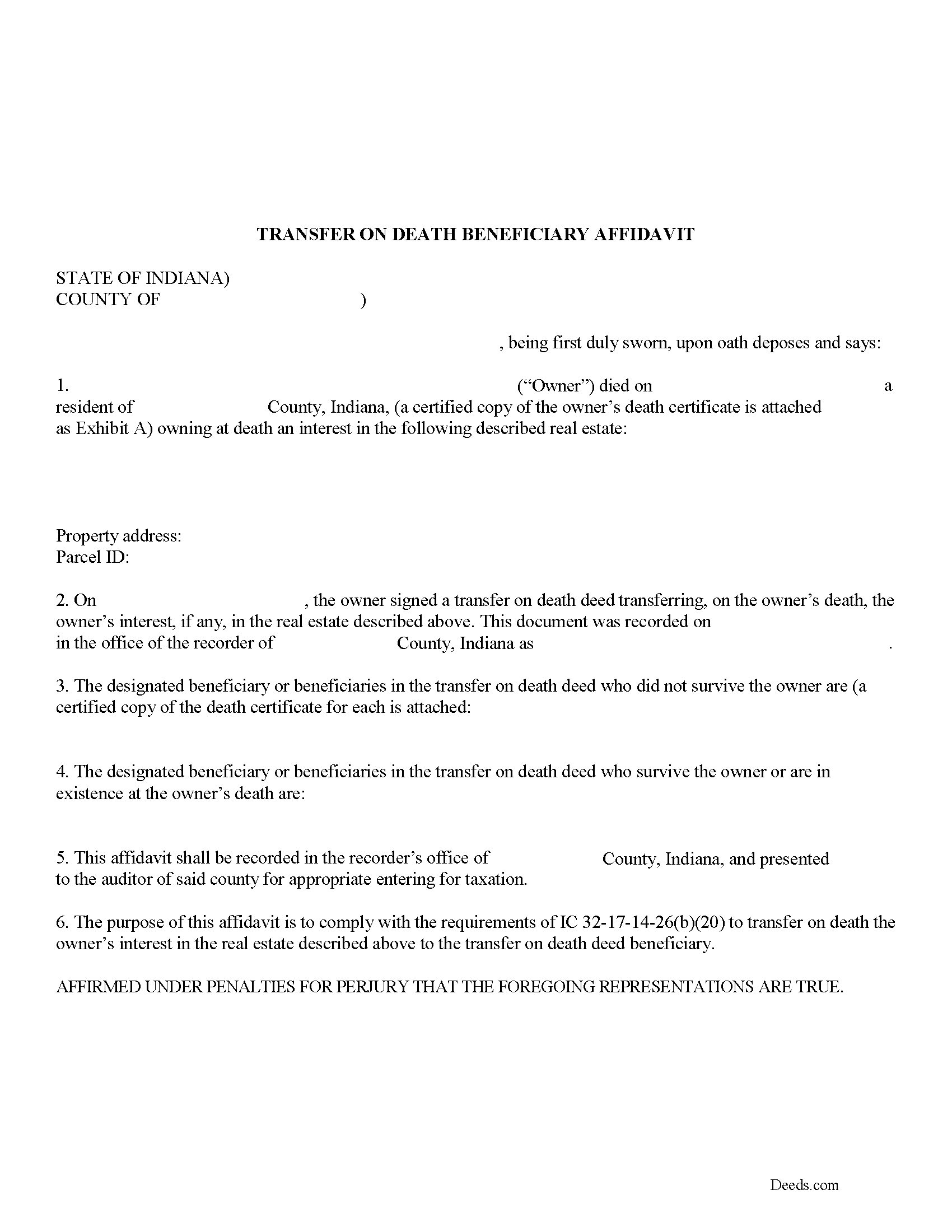
Indiana's transfer on death deeds are a useful way to convey ownership rights to property without the need for probate. The rules for claiming the property are defined in IC 32-17-14-26(b)(20). Primarily, the statute explains that the beneficiary must complete a transfer on death beneficiary affidavit containing specific details of the deed, present that affidavit to the local auditor to verify any transfer taxes, and then submit it to the county recorder who will enter it, and therefore the finalized conveyance, into the public record.
Beneficiaries listed on Indiana transfer on death deeds may use this form, which meets the statutory requirements, to claim ownership of the real property described in the deed.
(Indiana TOD Deed Beneficiary Affidavit Package includes form, guidelines, and completed example)... More Information about the Indiana Transfer on Death Deed Beneficiary Affidavit
General Durable Power of Attorney
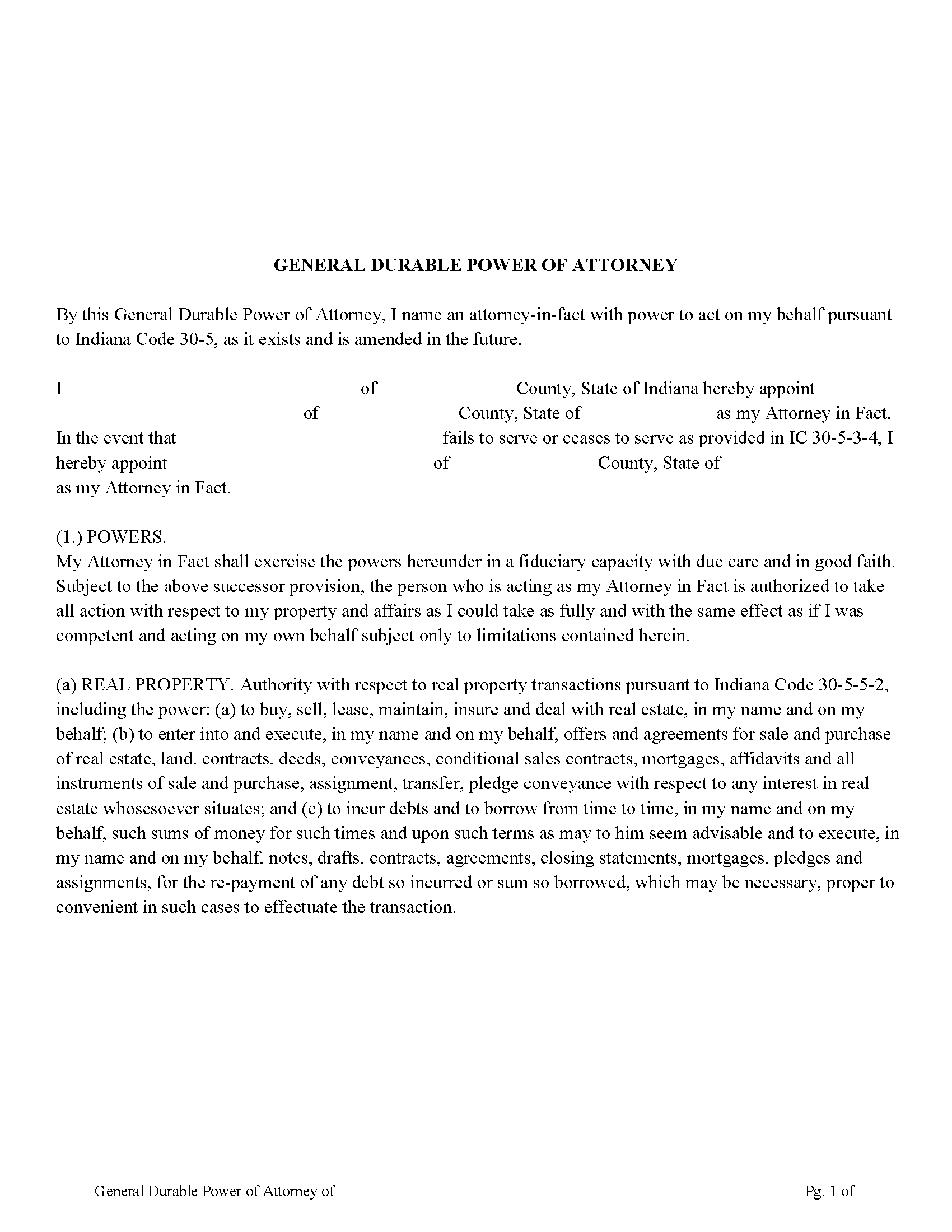
(5) Five Page General Durable Power of Attorney, following Indiana Code and subjects listed below.
By this General Durable Power of Attorney, you name an attorney-in-fact with power to act on your behalf pursuant to Indiana Code 30-5, as it exists and is amended in the future.
(a) REAL PROPERTY. Authority with respect to real property transactions pursuant to Indiana Code 30-5-5-2
(b) TANGIBLE PERSONAL PROPERTY. Authority with respect to tangible personal property transactions pursuant to Indiana Code 30-5-5-3
(c) BOND, SHARE AND COMMODITY. Authority with respect to bond, share. and commodity transactions pursuant to Indiana Code 30-5-5-4,
(d) BANKING. Authority with respect to banking transactions pursuant to Indiana Code 30-5-5-5, including but not limited to the authority:
(e) BUSINESS. Authority with respect to business operating transactions pursuant to Indiana Code 30-5-5-6, including the power:
(f) INSURANCE. Authority with respect to insurance transactions pursuant to
Indiana Code 30-5-5-7.
(g) BENEFICIARY. Authority with respect to beneficiary transactions pursuant to
Indiana Code 30-5-5-8.
(h) GIFTS. In the event I become permanently menta... More Information about the Indiana General Durable Power of Attorney
Limited Power of Attorney for Real Property
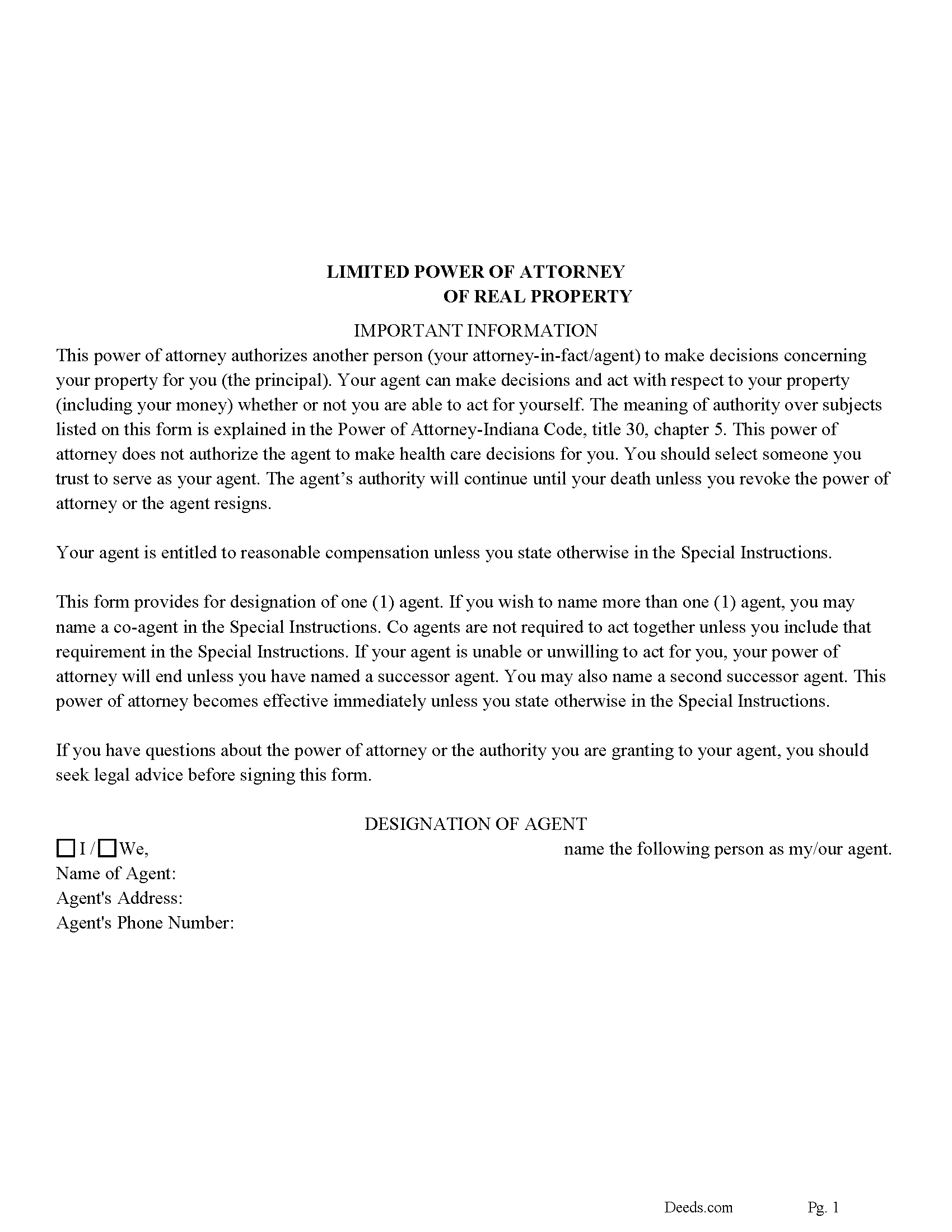
Use this power of attorney to appoint an agent to act on your behalf. The agent's powers follow IC 30-5-5-2 (Real property transactions) and are further limited by specifying a sole purpose to purchase, sell or refinance a specific property. The agent's powers can be further limited or defined in a "Special Instructions" section of the form. This POA terminates upon the satisfactory closing or upon a certain number of days (which you provide) after its execution, whichever happens first.
IC 30-5-5-2Real property transactions
Sec. 2. (a) Language conferring general authority with respect to real property transactions means the principal authorizes the attorney in fact to do the following:
(1) Accept as a gift or as security for a loan, to reject, demand, buy, lease, receive, or otherwise acquire either ownership or possession of an estate or interest in real property.
(2) Sell, exchange, convey with or without covenants, quitclaim, release, surrender, mortgage, encumber, partition or consent to partitioning, plat or consent to platting, lease, sublet, or otherwise dispose of an estate or interest in real property.
(3) Release in whole or in part, assign in whole or in p... More Information about the Indiana Limited Power of Attorney for Real Property
Mortgage Secured by Promissory Note
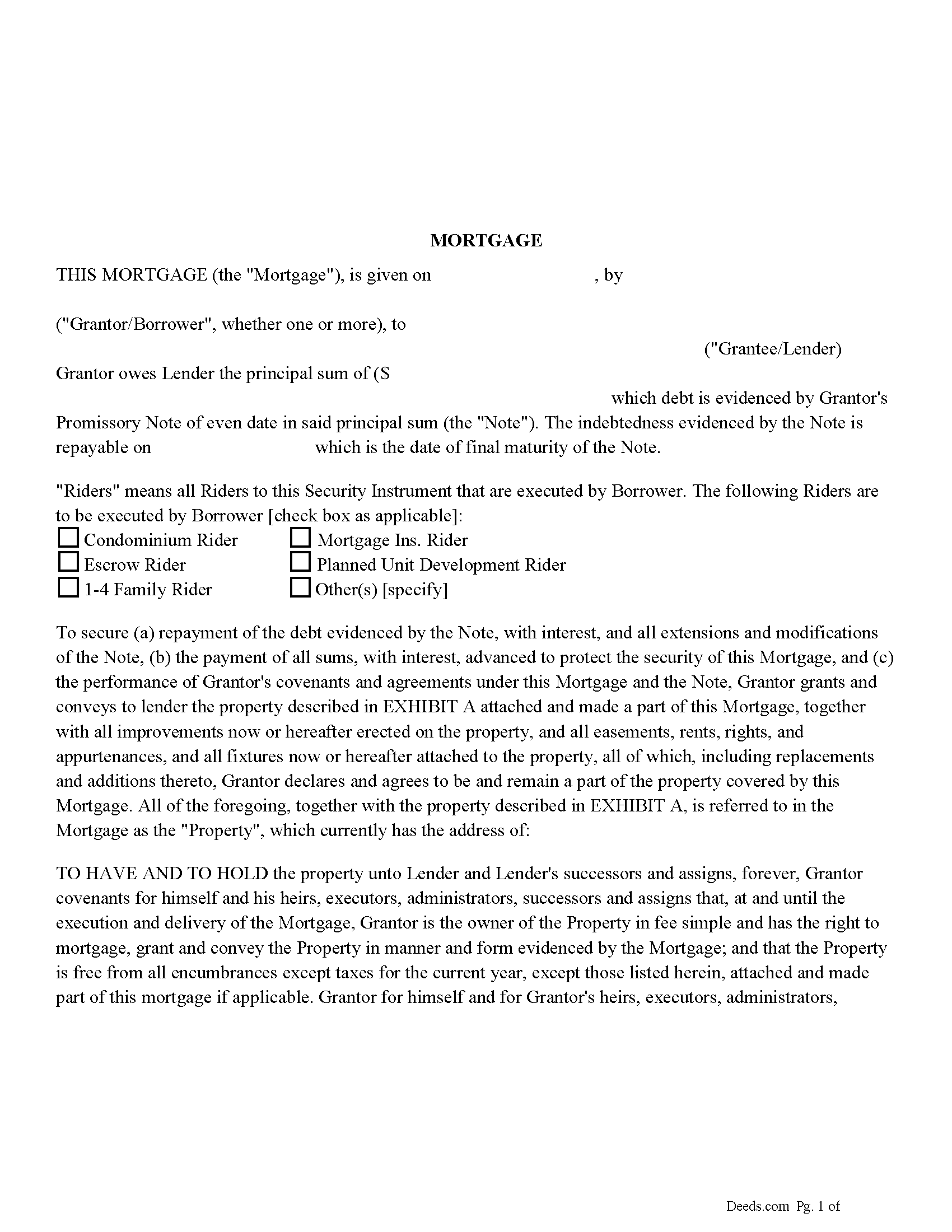
Indiana Mortgage -- IC 32-29; IC 36-2-7-10
Requires:
1. From parties (Grantor).
2. To parties (Grantees).
3. Legal description.
4. Amount.
5. Signatures with names typed or printed below or next to each name.
6. Signatures acknowledged or notarized.
7. Prepared by statement.
8. Social Security redaction statement.
IC 32-29-1-2 Construction of mortgage
Sec. 2. A mortgage may not be construed to imply a covenant for the payment of the sum intended to be secured by the mortgage so as to enable the mortgagee or the mortgagee's assignees or representatives to maintain an action for the recovery of this sum. If an express covenant is not contained in the mortgage for the payment and a bond or other separate instrument to secure the payment has not been given, the remedy of the mortgagee is confined to the real property described in the mortgage.
IC 32-29-1-5 Form; mortgage
Sec. 5. A mortgage of land that is:
(1) worded in substance as "A.B. mortgages and warrants to C.D." (here describe the premises) "to secure the repayment of" (here recite the sum for which the mortgage is granted, or the notes or other evidences of debt, or a description of the debt sought ... More Information about the Indiana Mortgage Secured by Promissory Note
Full Release of Mortgage
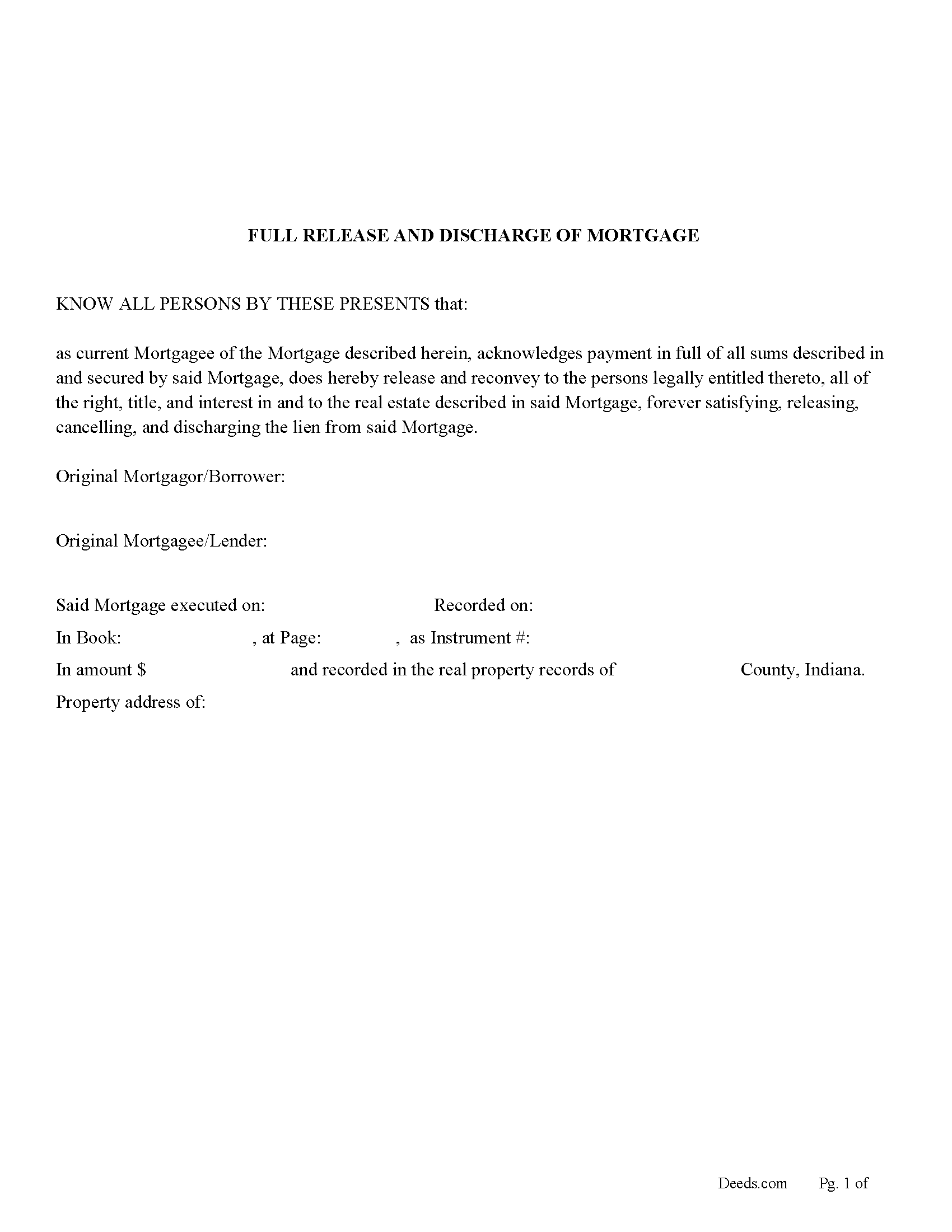
In general a lender has 15 days once notified to release a mortgage to avoid penalty.
((1) a sum not to exceed five hundred dollars ($500) for the failure, neglect, or refusal of the owner, holder, or custodian to:
(A) release;
(B) discharge; and
(C) satisfy of record the mortgage or lien; and
(2) costs and reasonable attorney's fees incurred in enforcing the release, discharge, or satisfaction of record of the mortgage or lien.
(c) If the court finds in favor of a plaintiff who files an action to recover damages under subsection (b), the court shall award the plaintiff the costs of the action and reasonable attorney's fees as a part of the judgment.
(d) The court may appoint a commissioner and direct the commissioner to release and satisfy the mortgage, mechanic's lien, judgment, or other lien. The costs incurred in connection with releasing and satisfying the mortgage, mechanic's lien, judgment, or other lien shall be taxed as a part of the costs of the action. (e) The owner, holder, or custodian, by virtue of having recorded the mortgage, mechanic's lien, judgment, or other lien in Indiana, submits to the jurisdiction of the courts of Indiana as to any action arising un... More Information about the Indiana Full Release of Mortgage
Affidavit of Surviving Spouse
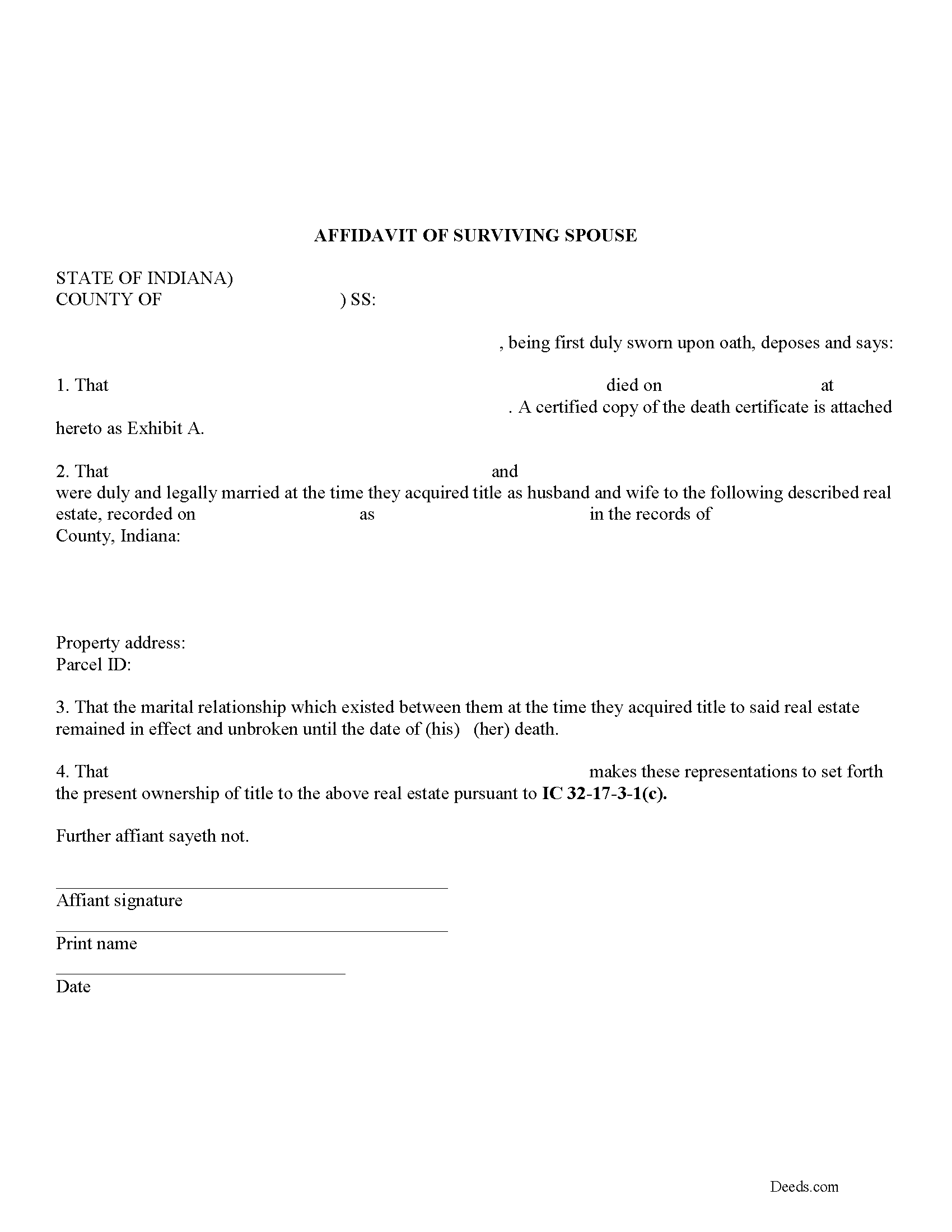
Married couples in Indiana may hold title to real estate as tenants by the entireties. This means that when one spouse dies, the other gains full ownership of the property by function of law, and without the need for probate. Use this instrument to formalize the acceptance of ownership rights conveyed when a spouse dies. Complete and sign the affidavit and submit it, along with a certified copy of the decedent's death certificate, to the recorder for the county where the real estate is located.
In order to gain full ownership, the husband or wife submits a completed affidavit of surviving spouse, along with an official copy of the death certificate of the deceased spouse, to the recorder for the county where the land is located.
This does not, however, remove the deceased's name from the deed. To accomplish that, the survivor must execute and record a new deed from the married couple to the remaining spouse only. After completing this final step, the public record and current deed will contain the most up-to-date information.
(Indiana Affidavit of Surviving Spouse Package includes form, guidelines, and completed example)
... More Information about the Indiana Affidavit of Surviving Spouse
Affidavit of Surviving Joint Tenant
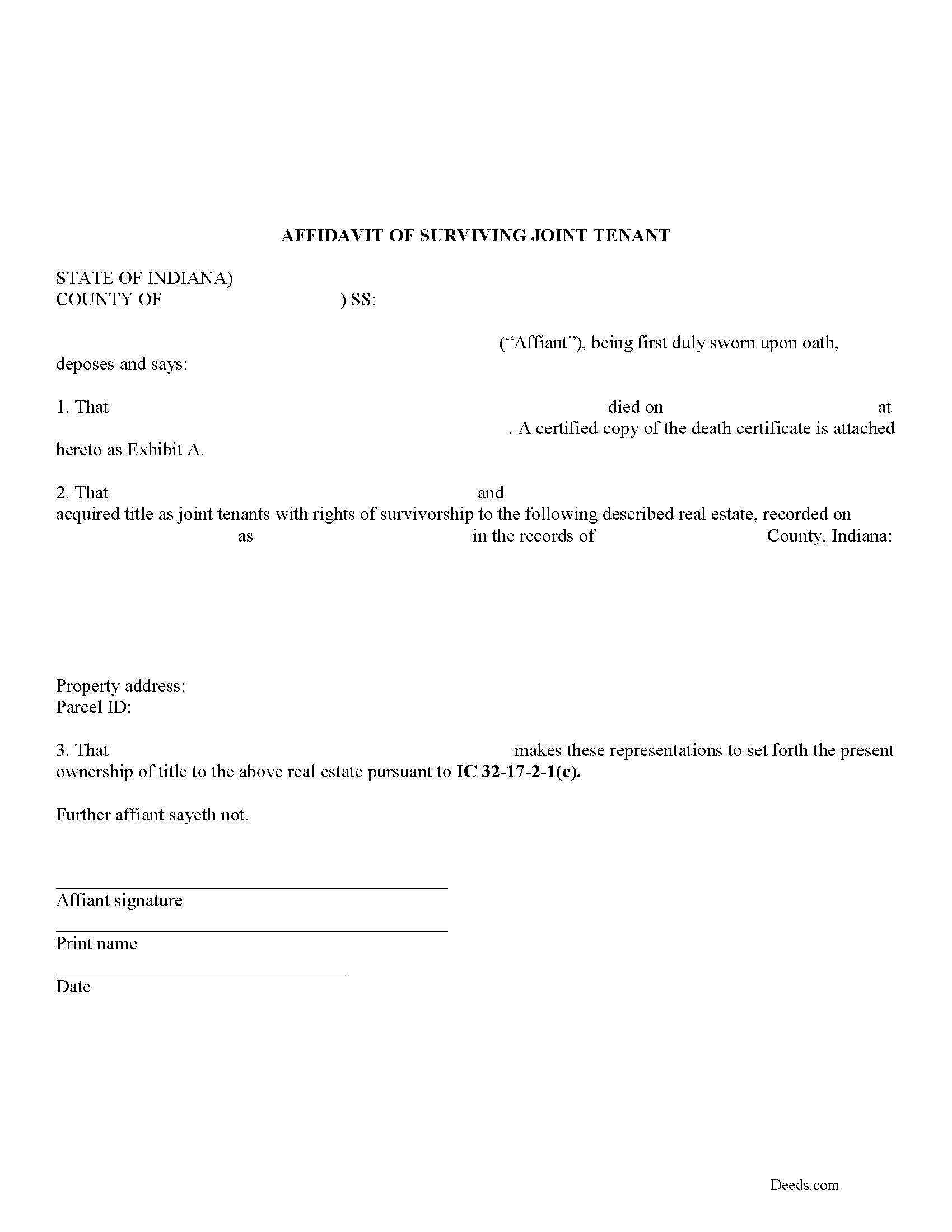
Use this instrument to formalize the acceptance of ownership rights conveyed when another joint tenant dies. Complete and sign the affidavit and submit it, along with a certified copy of the decedent's death certificate, to the recorder for the county where the real estate is located.
Holding title to real property in a survivorship tenancy is a convenient way to transfer ownership in land without probate. The Indiana Revised Code specifies the rules for co-ownership of real property in IC 32-17-2-1. This statute explains that two or more people who are not married to each other may own real estate as joint tenants with rights of survivorship as long as this intent is clearly stated in the text of the deed conveying title to them.
In order to gain full ownership, the surviving joint tenant need only submit a completed affidavit of surviving joint tenant, along with an official copy of the death certificate of the other owner, to the recorder for the county where the land is located.
This does not, however, remove the deceased's name from the deed. To accomplish that, the surviving tenant must execute and record a new deed from the original joint tenants to the remaining ... More Information about the Indiana Affidavit of Surviving Joint Tenant
Trustee Deed without Warranty
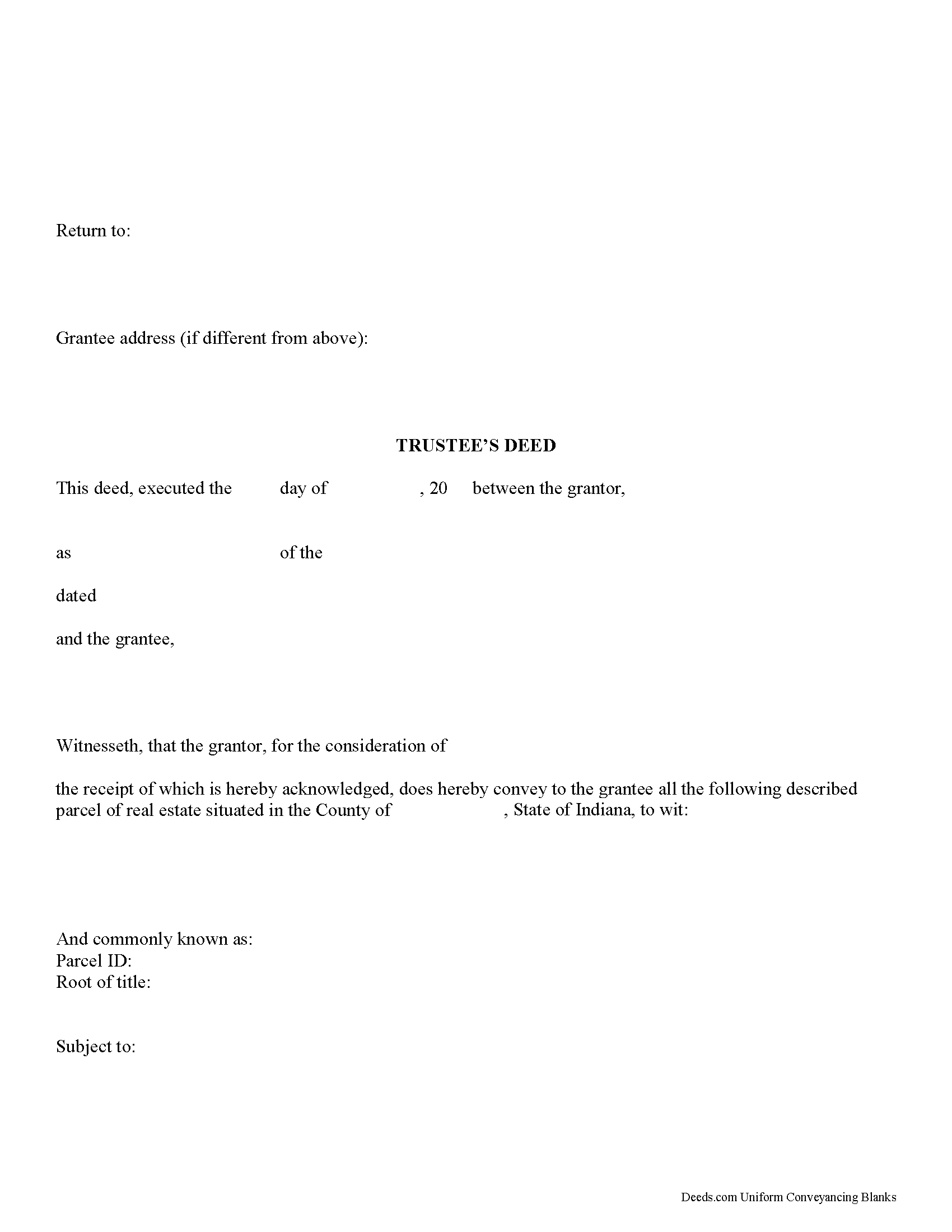
Use this form to transfer real property located in Indiana out of trust, without warranties of title. The deed should be executed by the trust's acting trustee(s).
A trustee's deed is an instrument used in trust administration to convey real property out of a trust. Unlike other forms of conveyance, which are named for the type of warranties they carry, the trustee's deed is named after the executing trustee.
The trustee is the administrator of a trust who is appointed by the settlor. The settlor is the person who funds the trust with assets -- in this case, real property. The settlor executes a trust instrument, which contains the provisions of the trust, including a designation of the trust's beneficiaries. This document is generally not of public record.
The trustee serves as the grantor in the trustee's deed. If there are multiple trustees or the trustee appears as a successor, this information is included also. The settlor does not enter directly into the transaction . In addition, the deed states the trust name and date under which the trustee is appearing, as well as any amendments made to the trust instrument.
All instruments of conveyance in Indiana require ... More Information about the Indiana Trustee Deed without Warranty
Trustee Deed with Warranty
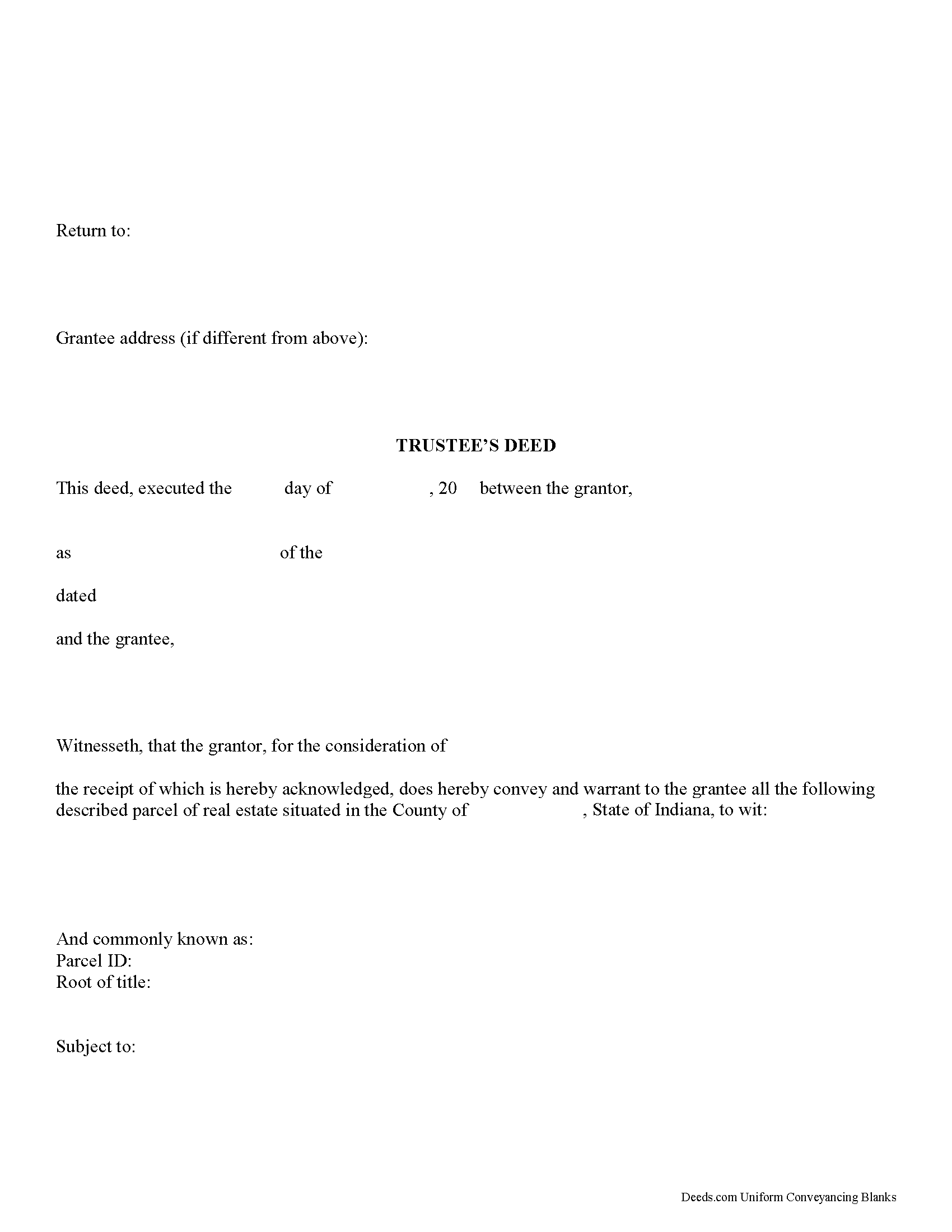
Trustees use this form to transfer real property located in Indiana out of trust, with warranties of title as set out in Ind. Code 32-17-1-2. The deed should be executed by the trust's acting trustee(s).
A trustee's deed is an instrument used in trust administration to convey real property out of a trust. Unlike other forms of conveyance, which are named for the type of warranties they carry, the trustee's deed is named after the executing trustee.
The trustee is the administrator of a trust who is appointed by the settlor. The settlor is the person who funds the trust with assets -- in this case, real property. The settlor executes a trust instrument, which contains the provisions of the trust, including a designation of the trust's beneficiaries. This document is generally not of public record.
The trustee serves as the grantor in the trustee's deed. If there are multiple trustees or the trustee appears as a successor, this information is included also. The settlor does not enter directly into the transaction. In addition, the deed states the trust name and date under which the trustee is appearing, as well as any amendments made to the trust instrument.
All instr... More Information about the Indiana Trustee Deed with Warranty
Personal Representative Deed for Distribution
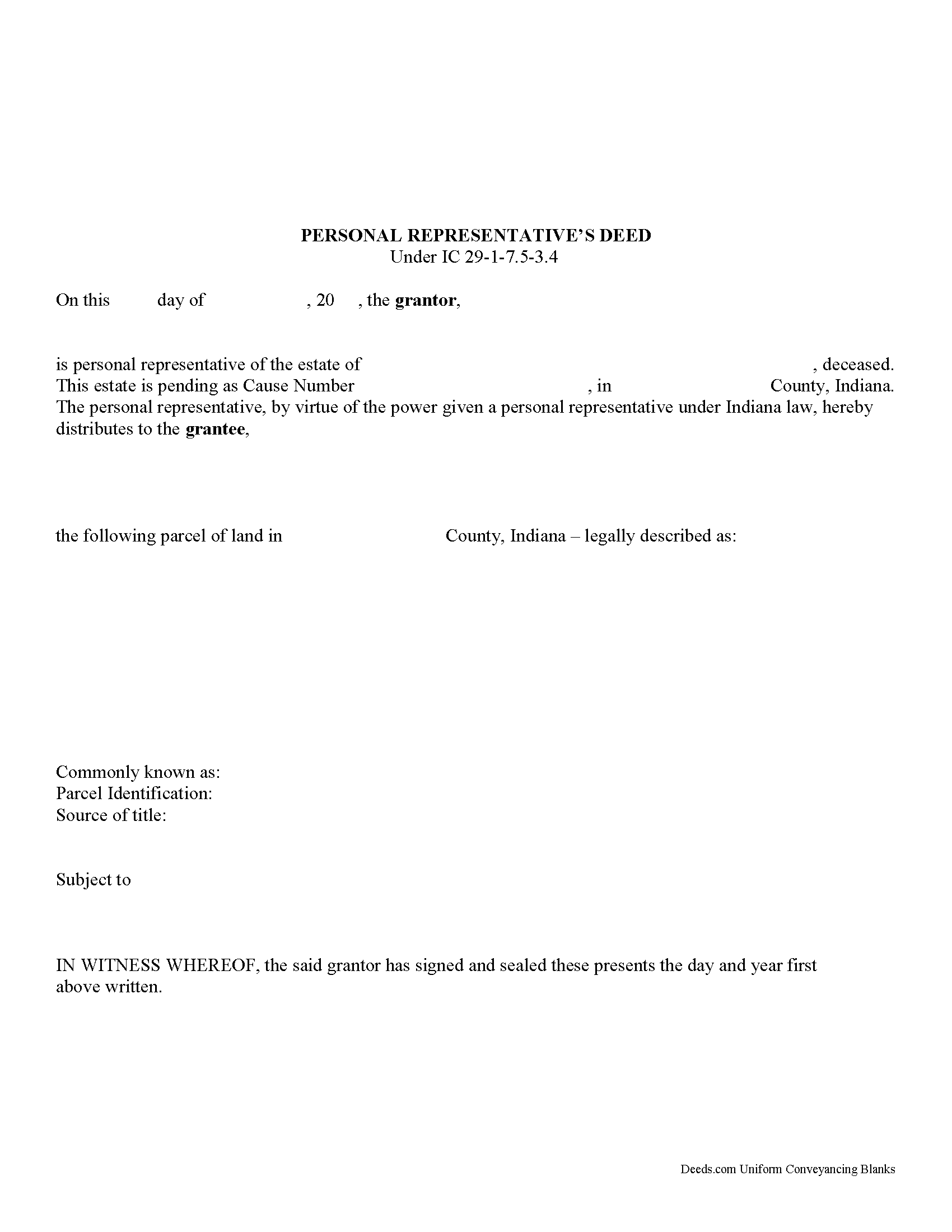
Use this form for authorized personal representatives to transfer a decedent's real estate to a devisee or heir as directed by the deceased property owner's will, or according to Indiana's laws of descent and distribution.
When we die, another person becomes responsible for managing the assets we leave behind. If we die testate (with a will), this person is called an executor. If we die intestate (without a will), or other specific situations occur, the court supervising the probate estate appoints an administrator. Once the executor or administrator is in place, Indiana laws identify this individual as a "personal representative." See IC 29-1-1-3(23) for the list of titles included under this role.
The judge supervising the case confirms the personal representative (PR) by issuing letters testamentary or letters of administration, as appropriate. Note that the PR must apply for the letters within five months of the decedent's death (IC 29-1-7-15.1(b)). Once the letters are in place, the PR gains access to the probate estate, defined as "property transferred at the death of a decedent under the decedent's will or under IC 29-1-2, in the case of a decedent dying intestate" IC ... More Information about the Indiana Personal Representative Deed for Distribution
Personal Representative Deed for Sale
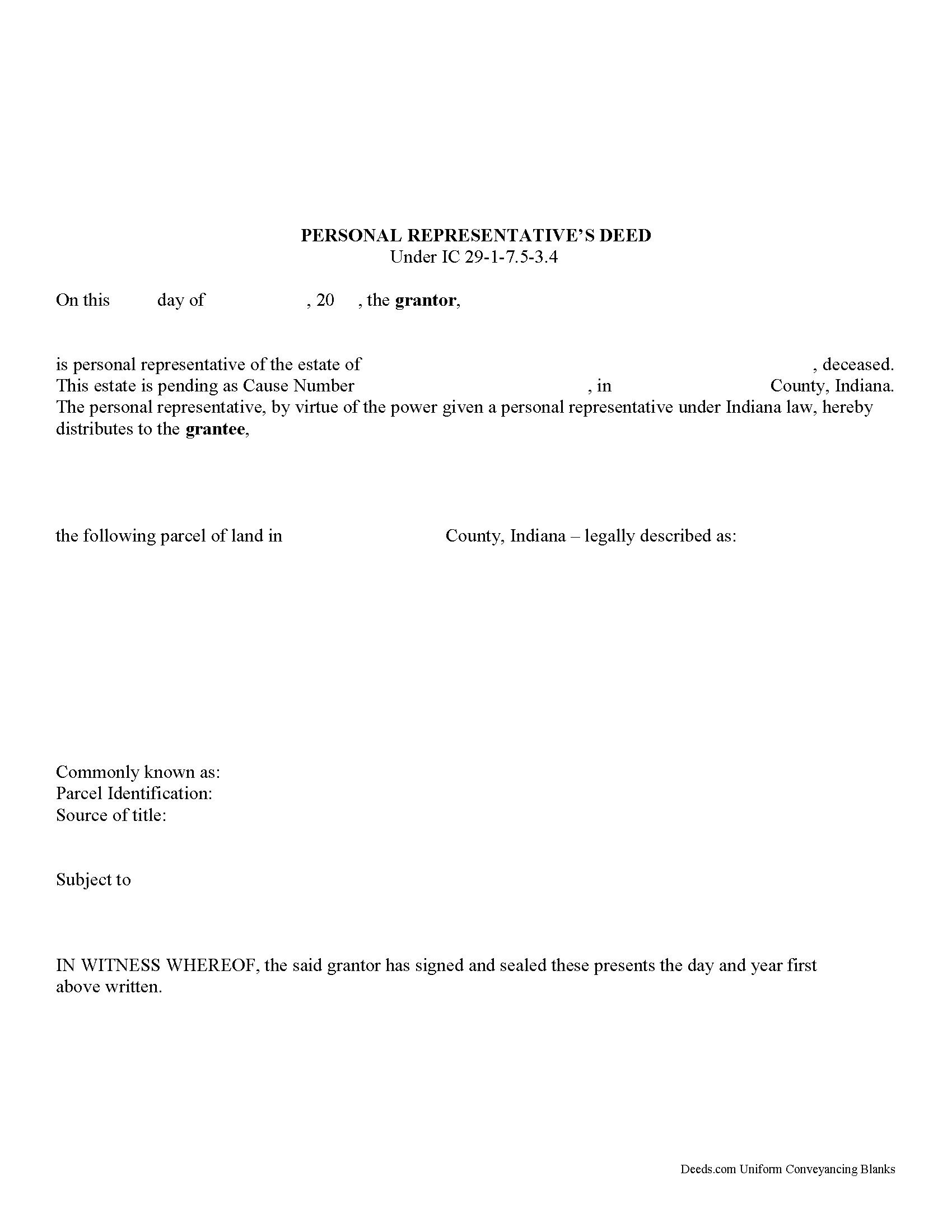
Indiana Personal Representative's Deed for Conveyance
Authorized personal representatives can use this form when selling real property from a decedent's estate.
When we die, another person becomes responsible for managing the assets we leave behind. If we die testate (with a will), this person is called an executor. If we die intestate (without a will), or in other specific situations, the court supervising the probate estate appoints an administrator. Once the executor or administrator is in place, Indiana laws identify this individual as a "personal representative," or PR. See IC 29-1-1-3(23) for the list of titles included under this role.
The judge supervising the case gives confirmation of the personal representative's authority by issuing letters testamentary or letters of administration, as appropriate. Note that the PR must apply for the letters within five months of the decedent's death (IC 29-1-7-15.1(b)). Once in place, the PR gains access to the probate estate, defined as "property transferred at the death of a decedent under the decedent's will or under IC 29-1-2, in the case of a decedent dying intestate" IC 29-1-1-3(24).
One common task handled by the PR... More Information about the Indiana Personal Representative Deed for Sale
Notice of Furnishing
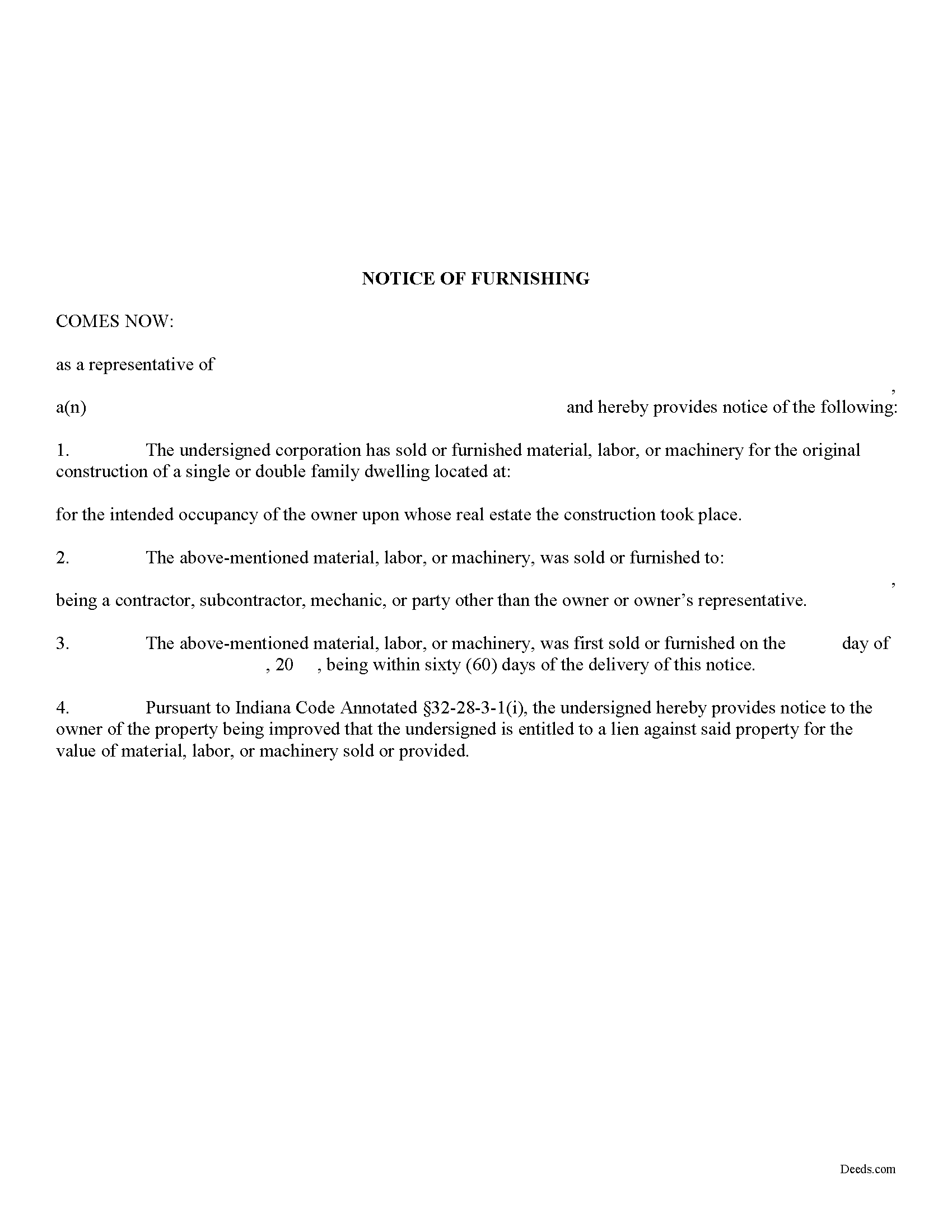
To secure lien rights in Indiana, a lien claimant must provide a residential property owner a Notice of Furnishing. The purpose on the Notice is to apprise the owner that someone is providing material, labor, or machinery on their land and that person may have a right to file a mechanic's lien.
A person, firm, partnership, limited liability company, or corporation that sells or furnishes on credit any material, labor, or machinery for the alteration or repair of an owner occupied single or double family dwelling or the appurtenances or additions to the dwelling to: 1) a contractor, subcontractor, mechanic; or 2) anyone other than the occupying owner or the owner's legal representative; must furnish to the occupying owner of the parcel of land where the material, labor, or machinery is delivered a written notice of the delivery or work and of the existence of lien rights not later than thirty (30) days after the date of first delivery or labor performed. IC 32-28-3-1(h). The furnishing of the notice is a condition precedent to the right of acquiring a lien upon the lot or parcel of land or the improvement on the lot or parcel of land. Id.
The Notice of Furnishing contains the ... More Information about the Indiana Notice of Furnishing
Notice of Intention to Hold Lien
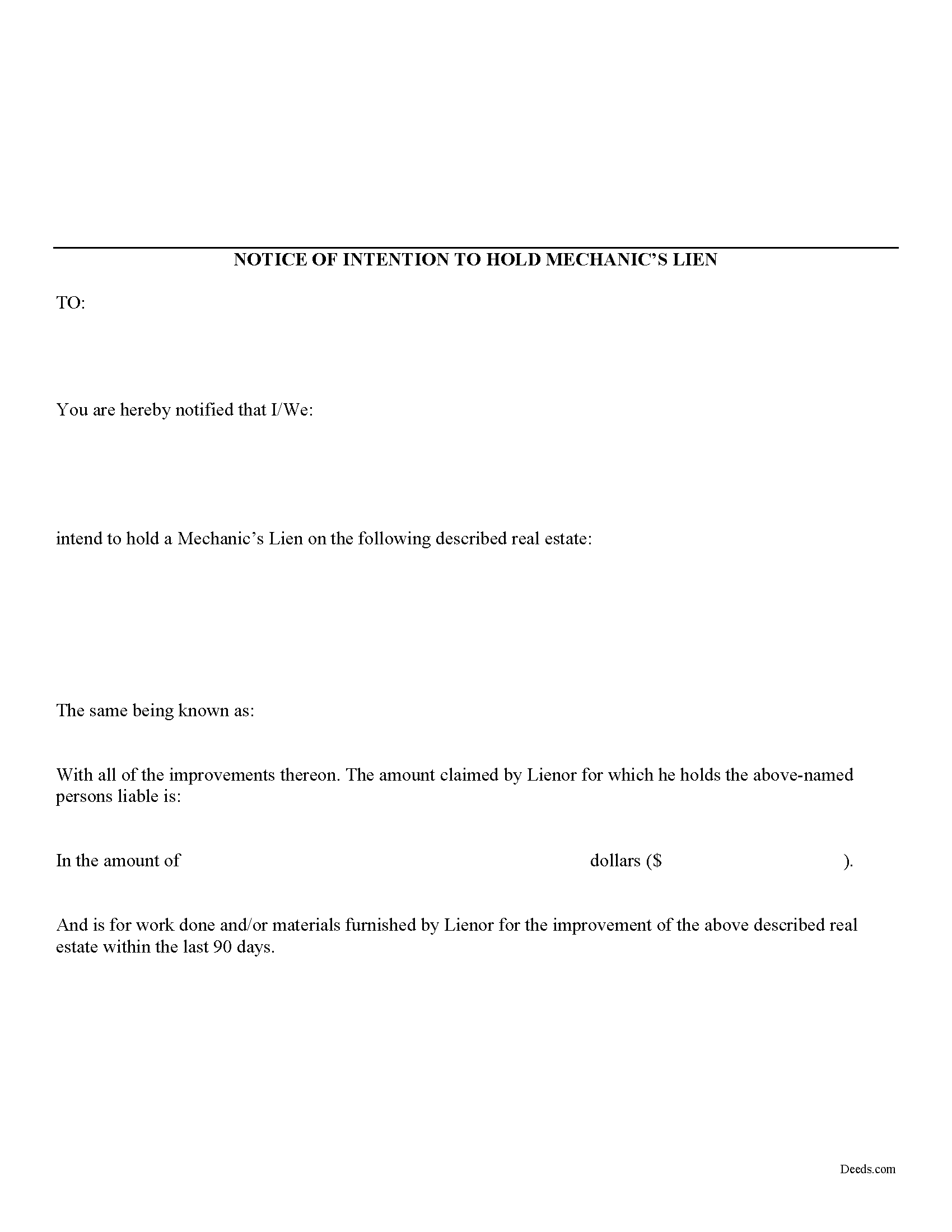
A Notice of Intention to Hold a Mechanic's Lien is a required pre-lien notice used to make property owners aware that there may be lien rights exercised on their property.
Any person who wishes to acquire a lien upon public property or property held by three or more tenants, whether the claim is due or not, must file in duplicate a sworn statement and notice of the person's intention to hold a lien upon the property for the amount of the claim: (1) in the recorder's office of the county; and (2) not later than ninety (90) days after performing labor or furnishing materials or machinery. IC 32-28-3-3(a).
Any person who wishes to acquire a lien upon property held as a dwelling unit, whether the claim is due or not, must file in duplicate a sworn statement and notice of the person's intention to hold a lien upon the property for the amount of the claim: (1) in the recorder's office of the county; and (2) not later than sixty (60) days after performing labor or furnishing materials or machinery. IC 32-28-3-3(b).
The statement and notice of intention to hold a lien may be verified and filed on behalf of a client by an attorney registered with the clerk of the supreme court as a... More Information about the Indiana Notice of Intention to Hold Lien
Mechanics Lien
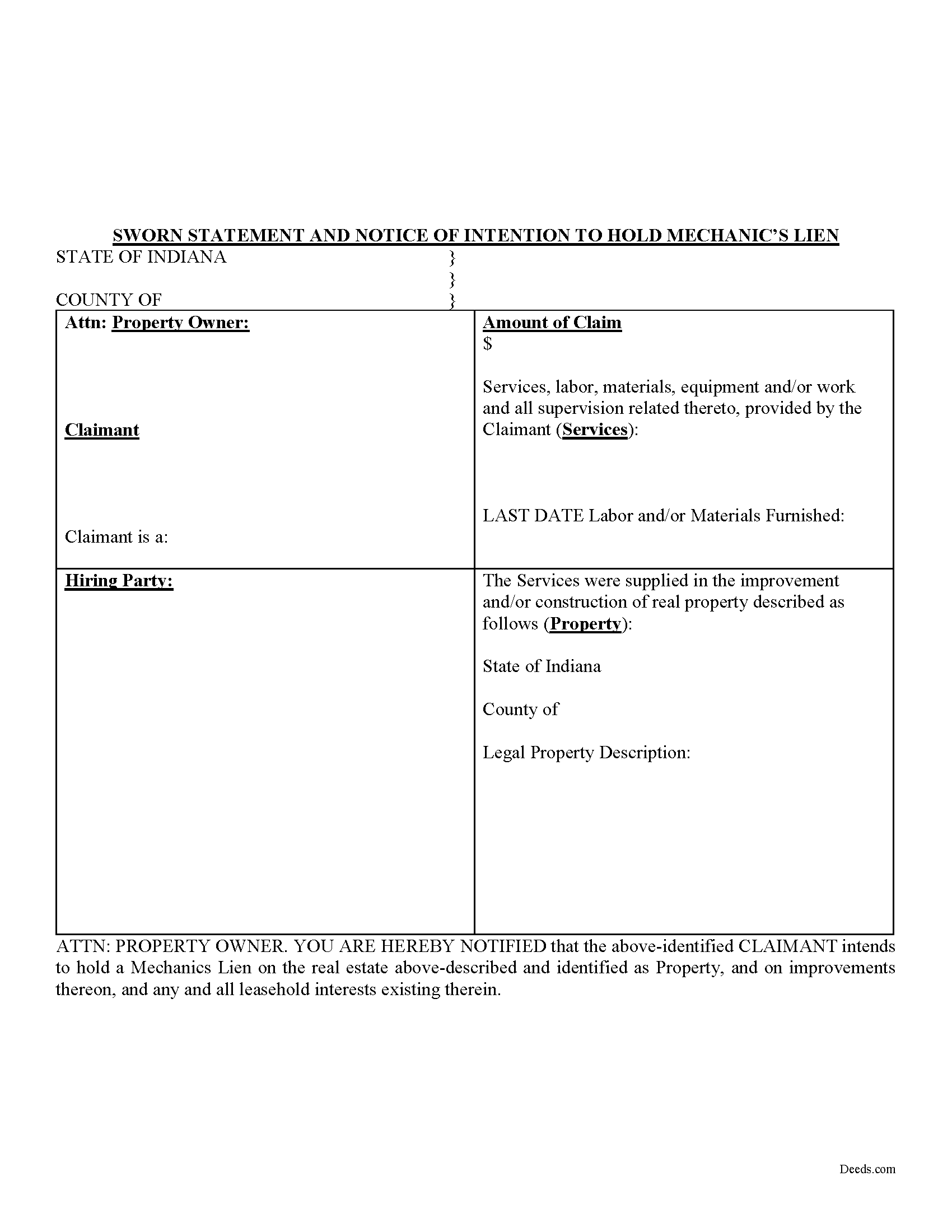
Mechanic's liens are used to compel an owner or other party to pay an outstanding bill for a work of improvement on real property. For instance, a contractor that completes work on a property might get stiffed on a bill due to disagreement about the scope of work or a baseless complaint about the finished job. Because liens prevent an owner from selling or refinancing a property (or make it difficult to do so), liens are an effective remedy for contractors and other parties to earn their payment.
In Indiana, mechanic's liens are available to a contractor, subcontractor, mechanic, or a lessor leasing construction and other equipment and tools. IC 32-28-3-1(a). Such liens can be granted to parties involved in the erection, alteration, repair, or removal of a house, mill, manufactory, or other building. Id. They are also available for operations involving waterworks, earthmoving, or other drainage and sewerage works. Id.
Any eligible claimant can get a lien, either separately or jointly, on the structure or property that the person erected, altered, repaired, moved, or removed. IC 32-28-3-1(b). The same terms apply to parties who furnished materials or machinery. Id. A claiman... More Information about the Indiana Mechanics Lien
Partial Lien Waiver
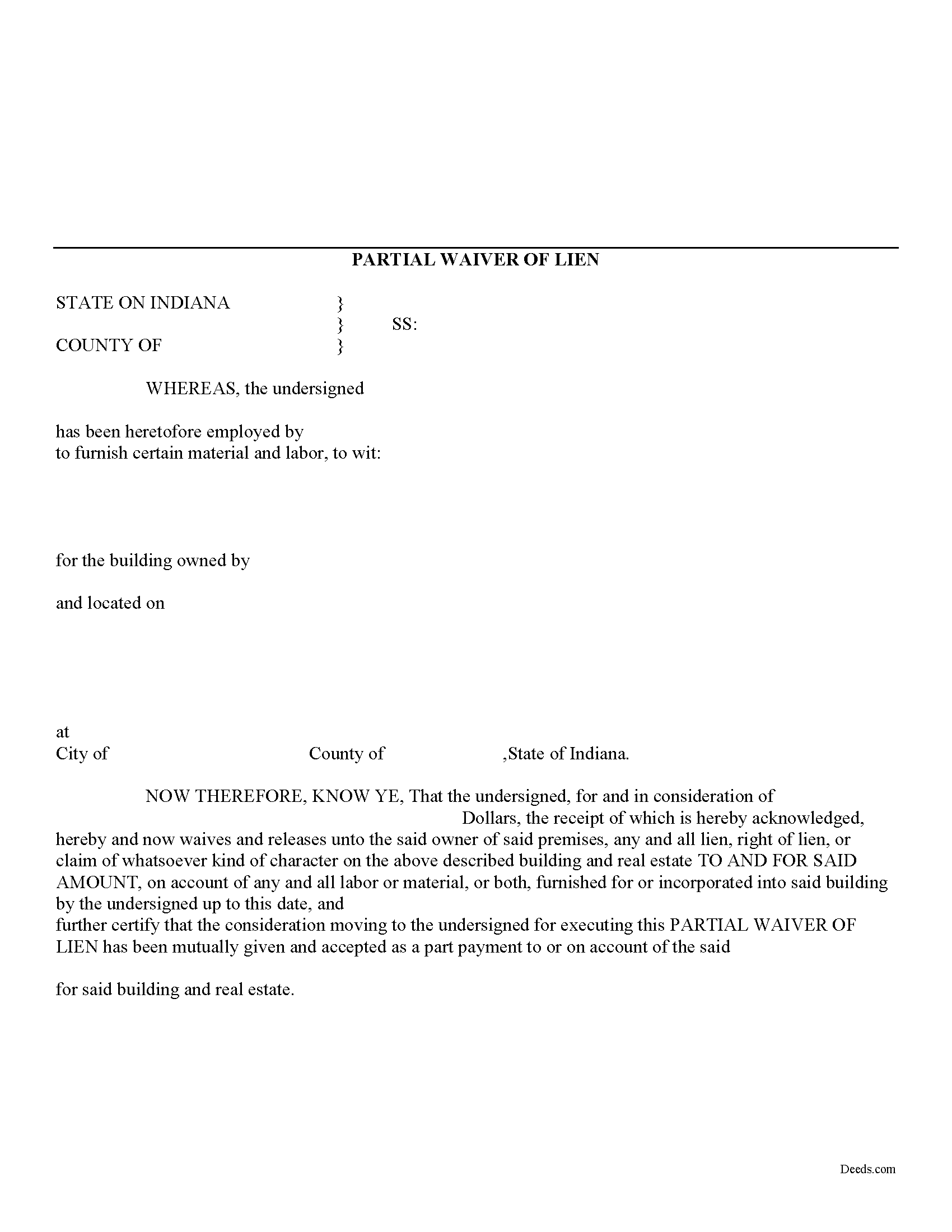
Mechanic's liens are governed under Title 32 of the Indiana Code. A waiver is a knowing relinquishment of a right. In this case, the person granting the waiver is relinquishing the right to seek a mechanic's lien for all or part of the amount due. This assurance is usually enough to get the other party to pay. In Indiana, there are no statutory forms for waivers, although according to the principles of contract law, the parties may agree to such modifications in writing.
A partial conditional waiver is used when a progress or partial payment is made and money is still due and owing. The waiver applies only to the partial payment amount and is conditioned upon the actual receipt of that money. Waivers must identify the parties, the type of materials/services provided, the location of the job, the amount paid/dates covered, and the claimant's notarized signature. Record the completed document in the land records for the county where the property is located.
This article is provided for information purposes only and should not be relied upon as a substitute for the advice from an attorney. Please speak with an Indiana attorney with questions about using a lien waiver, or any ot... More Information about the Indiana Partial Lien Waiver
Final Lien Waiver
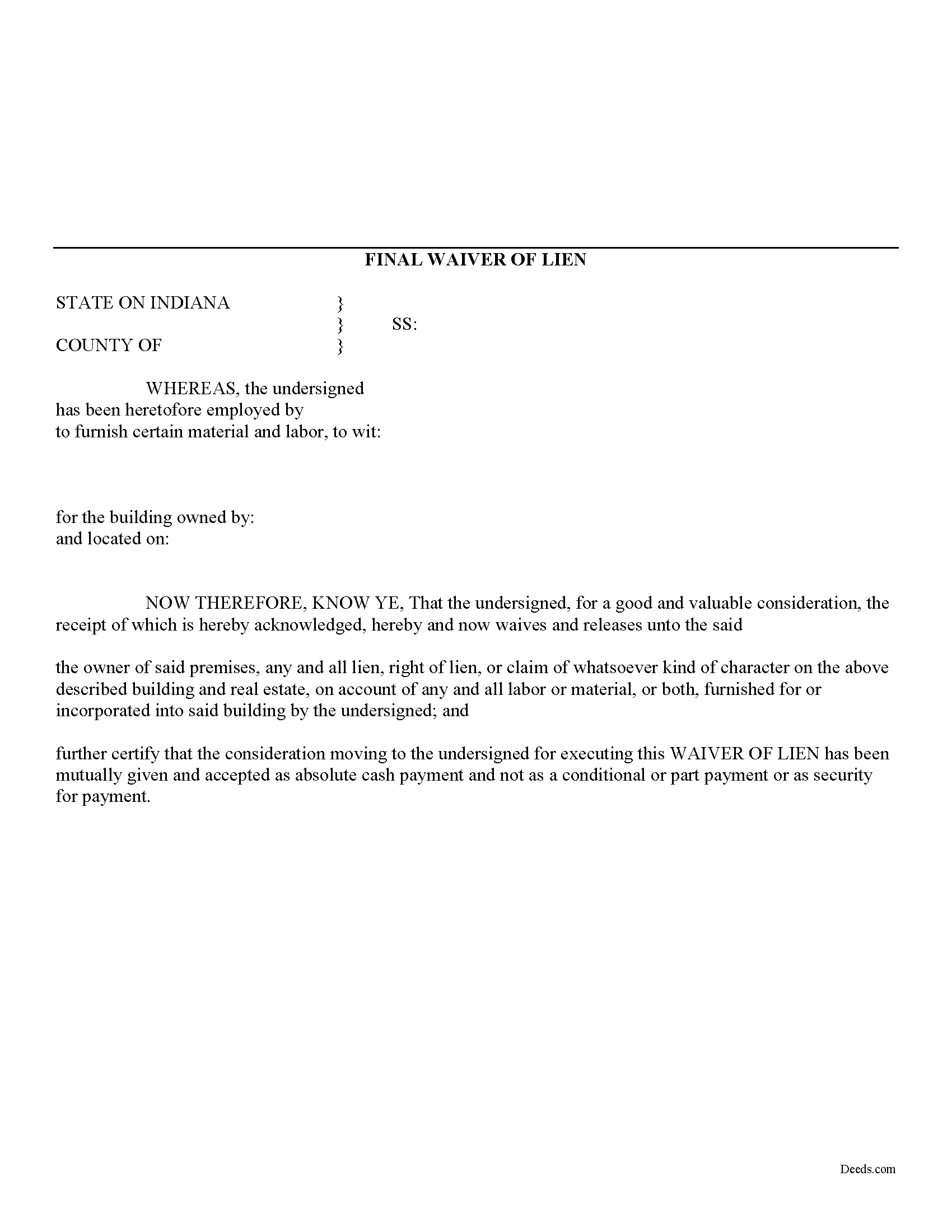
Mechanic's liens are governed under Title 32 of Indiana Code. A waiver is a knowing relinquishment of a right. In this case, the person granting the waiver is relinquishing the right to seek a mechanic's lien for all or part of the amount due. This assurance is usually enough to get the other party to pay. In Indiana, there are no statutory forms for waivers although according to the principles of contract law, the parties may agree to such modifications in writing.
Use the final waiver when a customer makes the final payment, meaning nothing is left due and owing after this payment. This waiver is conditioned upon the payment actually clearing and it will not be effective until that happens.
Waivers must identify the parties, the type of materials/services provided, the location of the job, and the claimant's notarized signature. Record the completed document in the land records for the county where the property is located.
This article is provided for information purposes only and should not be relied upon as a substitute for the advice from an attorney. Please speak with an Indiana attorney with questions about using a lien waiver, or any other issues related to mecha... More Information about the Indiana Final Lien Waiver
Satisfaction of Lien
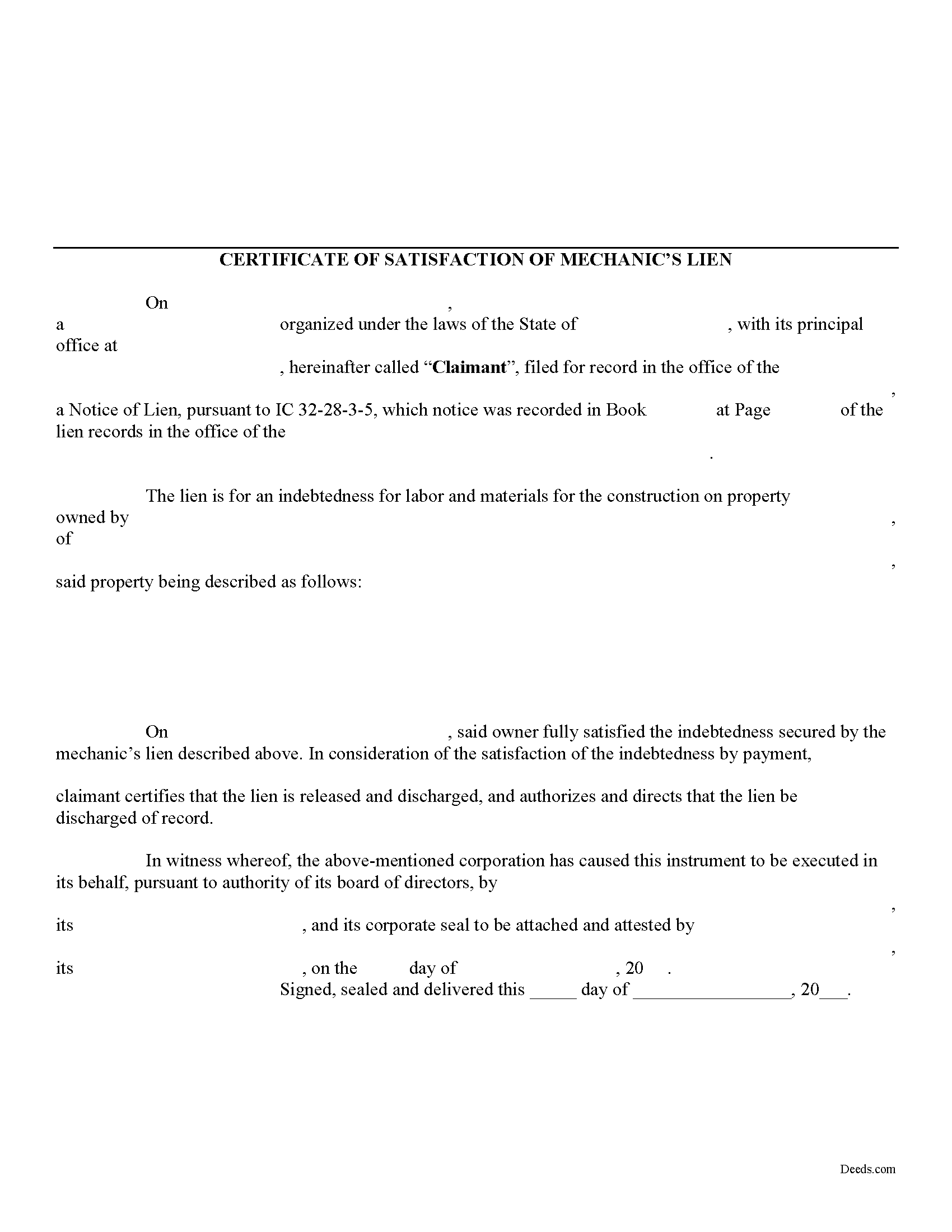
A Certificate of Satisfaction of MECHANIC'S Lien is used to certify that a MECHANIC'S lien has been paid off in full and that the official who originally recorded the lien is instructed to strike or erase the lien from the record. While Indiana statute does not specifically provide for a form of satisfaction of a lien, this document will suffice to discharge any recorded liens.
Use the Certificate of Satisfaction of Lien when a lien has been satisfied in full or if the lien is no longer necessary for any other reason. The Satisfaction of Lien document includes the following information: 1) lien claimant's name; 2) details of the underlying lien including office where recorded, date of recording, and book and page number of recording index; 3) owner's name and address; 4) a legal property description; 5) date lien satisfied; 6) the contractor's name and title; and 7) witnesses name and date witnessed.
Record the Certificate in the office where the lien was originally filed. Following its filing, the lien will be discharged and released from the record.
This article is provided for informational purposes only and should not be relied upon as a substitute for advice from an a... More Information about the Indiana Satisfaction of Lien
Lis Pendens Notice
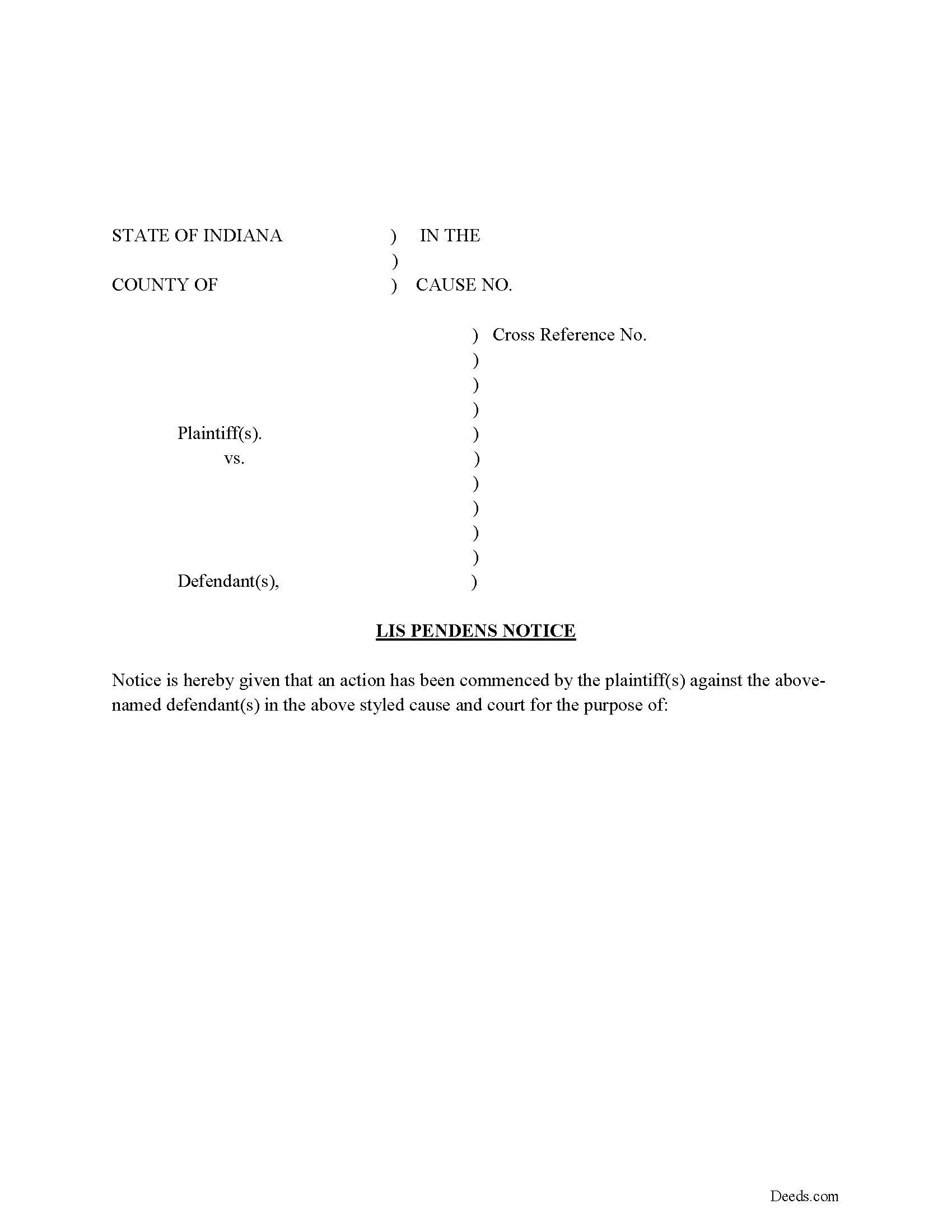
In general, for a Lis Pendens Notice to become constructive notice to would be purchasers or encumbrancers a Lis Pendens shall be recorded with the County Recorder where said property is located. Also (Each clerk of the circuit court shall keep a lis pendens record. The lis pendens record is a public record ) (IC 32-30-11-1 "Lis pendens record" Sec. 1.)
In general the Lis Pendens contains:
(1) the title of the court;
(2) the names of all the parties to the suit;
(3) a description of the real estate to be affected; and
(4) the nature of the lien, right, or interest sought to be enforced against the real estate.
(Indiana Lis Pendens Notice Package includes form, guidelines, and completed example)
... More Information about the Indiana Lis Pendens Notice
Release of Lis Pendens Notice
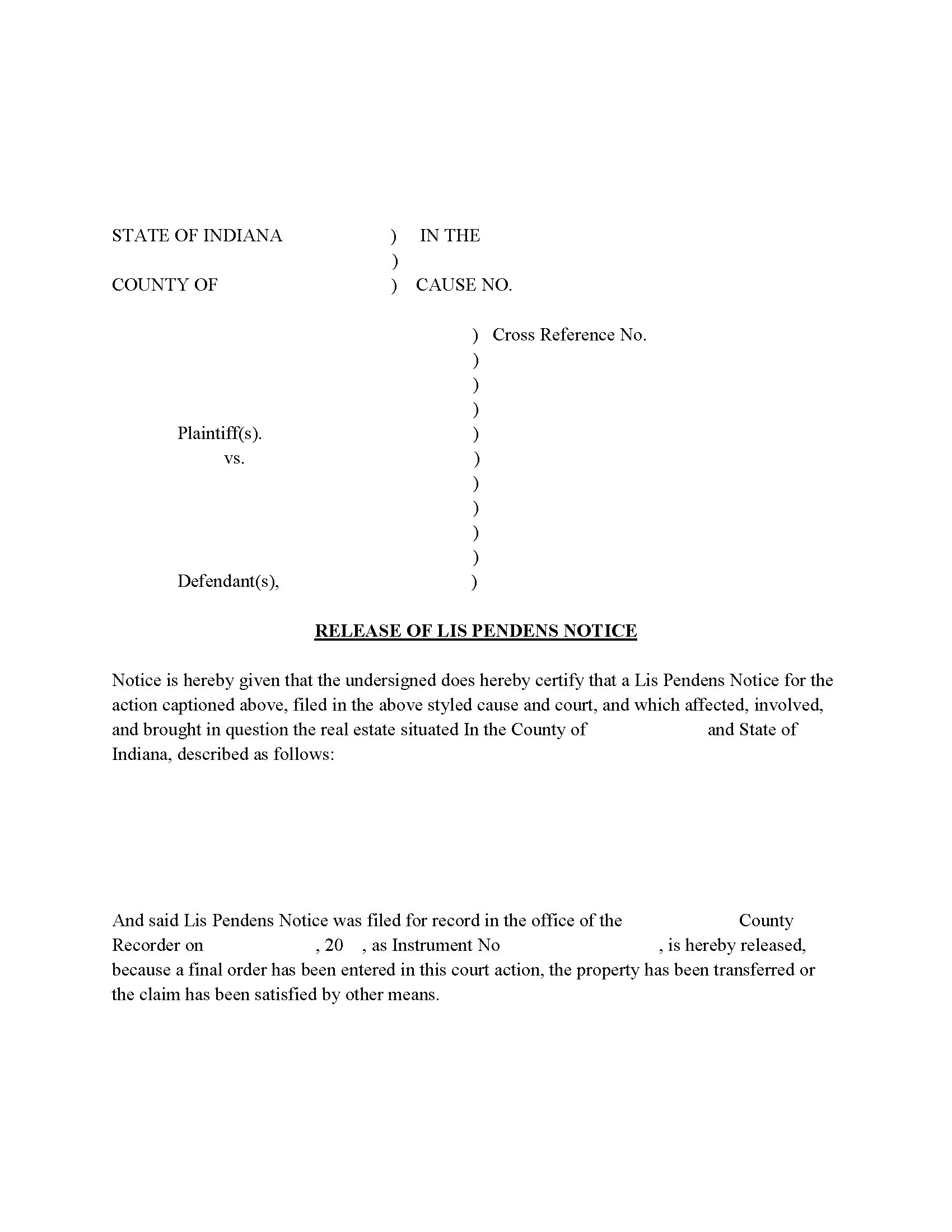
Use this form to release a previously recorded Lis Pendens Notice.
(Indiana Release of Lis Pendens Package includes form, guidelines, and completed example)... More Information about the Indiana Release of Lis Pendens Notice
Disclaimer of Interest
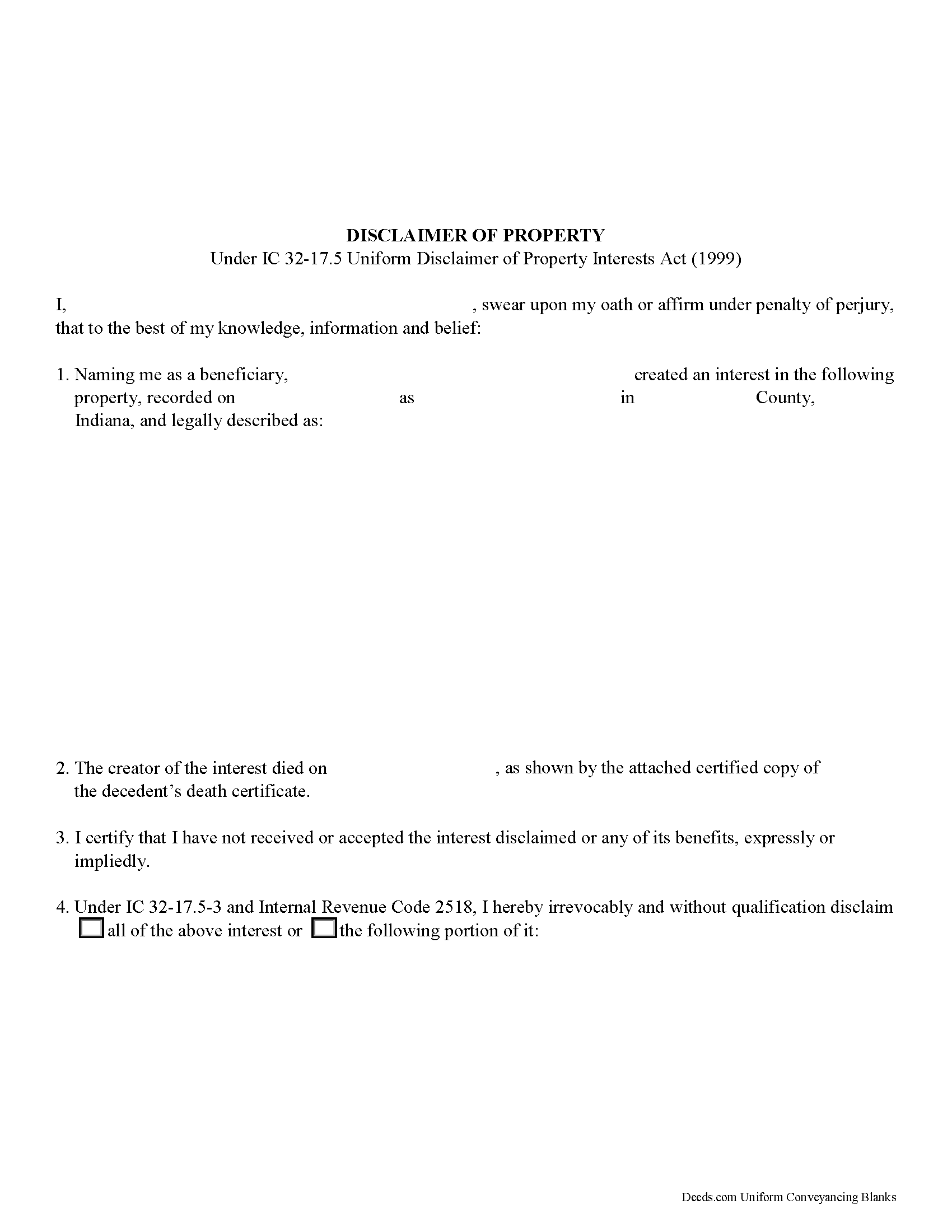
Under the Indiana Uniform Disclaimer of Property Interests Act, found at IC 32-17.5, the beneficiary of an interest in property may renounce the gift, either in part or in full (IC 32-17.5-3-1, 4). Note that the option to disclaim is only available to beneficiaries who have not acted in any way to indicate acceptance or ownership of the interest (IC 32-17.5-8-2).
The disclaimer must be in writing and include a description of the interest, a declaration of intent to disclaim all or a defined portion of the interest, and be signed by the disclaimant in front of a notary (IC 32-17.5-3-3).
Deliver the disclaimer within nine months of the transfer (e.g., the death of the creator of the interest) to the personal representative of the decedent's estate or the court having jurisdiction to appoint such a person (IC 32-17.5-7). In the case of real property, acknowledge the disclaimer as is required for a deed and record it in the county where the property is located. In addition, deliver a copy of the disclaimer to the person or legal entity with current custody or possession of the property.
A disclaimer is irrevocable and binding for the disclaiming party, so be sure to consult ... More Information about the Indiana Disclaimer of Interest
Certificate of Trust
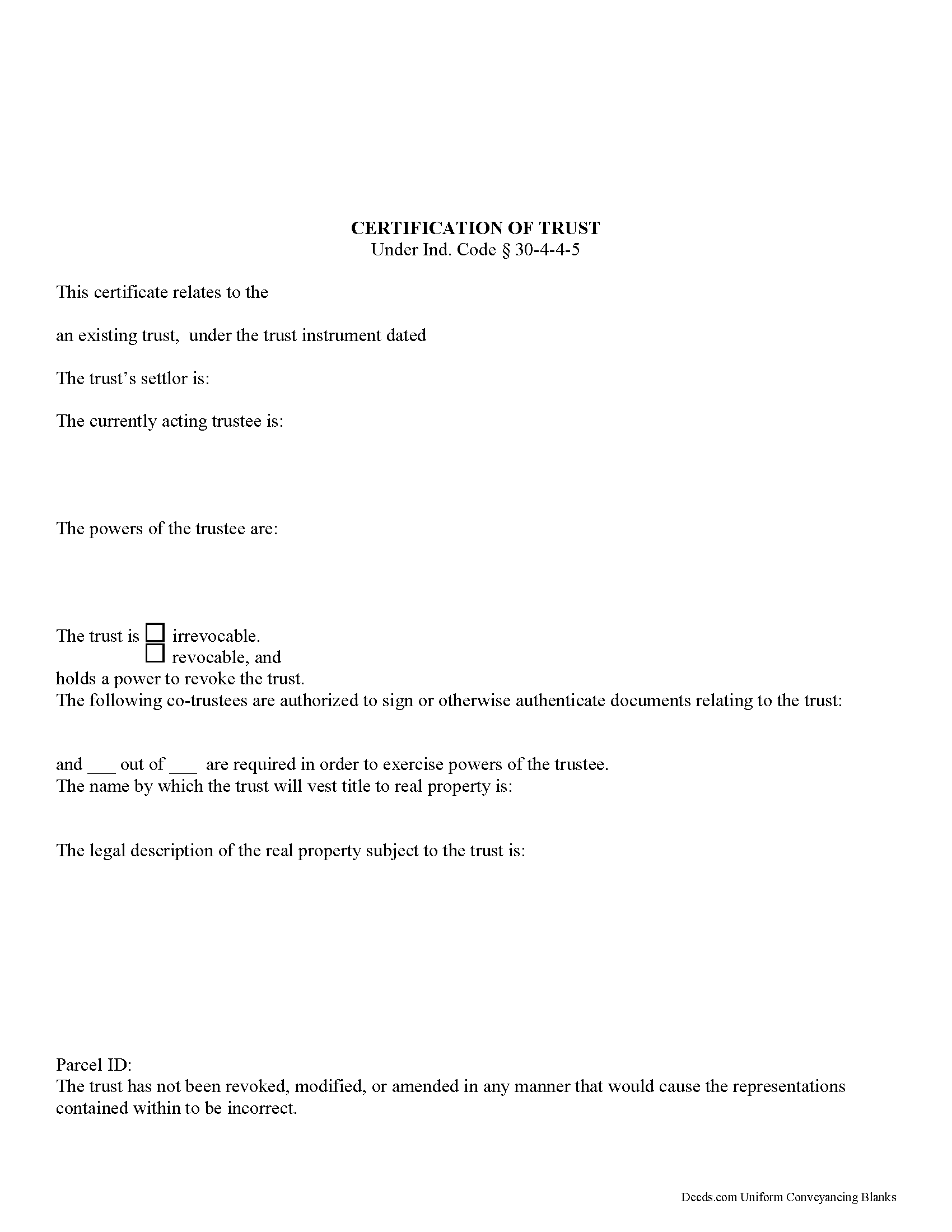
Codified at Indiana Code 30-4-4-5, a certification of trust is a document presented by a trustee as evidence of the trustee's authority to act on behalf of a trust.
Lending institutions or other third parties might request a certification of trust before they enter into any transactions with a trustee. Since trust instruments are not recorded, the identities of those with a beneficial interest in the trust remain private. The certification presents only the essential information needed while maintaining confidentiality of personal information a trustee or trust maker may not wish to disclose.
The certification verifies the existence of the trust under which the trustee is named. The document provides basic information, such as the name and date of the trust; the type of trust and who, if any, retains a power to revoke the trust; the identity of the trust's settlor; and the identities of all acting trustees. If a trust has co-trustees, the certification states how many co-trustees are required to sign off on documents relating to the trust, as well as their identities. In addition, the certification provides the name by which the trust is to hold assets.
As with other doc... More Information about the Indiana Certificate of Trust